

The Only Germany Travel Guide You’ll Ever Need
Last Updated: January 5, 2024
*FYI - this post may contain affiliate links, which means we earn a commission at no extra cost to you if you purchase from them. Also, as an Amazon Associate I earn from qualifying purchases. Check out our Privacy Policy and Disclosure. for more info.
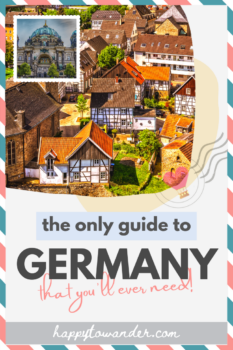
While most commonly associated with beers, bratwursts and tight leather pants, Germany is a country full of delightful finds that extend far beyond the stereotypes.
From dreamy castles and fairytale towns to awe-inspiring nature and sprawling cities, Deutschland has a little something for every kind of traveler… although I’ll admit the leather pants are also great.
I first visited Germany on a 6 week backpacking trip across Europe, and as I sipped my comically large beer under the toasty Berlin sun, I felt a strange sense of calm and belonging.
Spurred by this hunch, I moved to Munich. One study abroad, and 5 years later, I’m still here, with so much giddy enthusiasm for this country that I’ve become a thoroughly insufferable dinner guest.
But my social life’s loss is your gain, my friend… because today, I’ve decided to channel all my Deutschland fangirl tendencies into this concise Germany travel guide filled with all my top tips, itineraries, and recommendations.
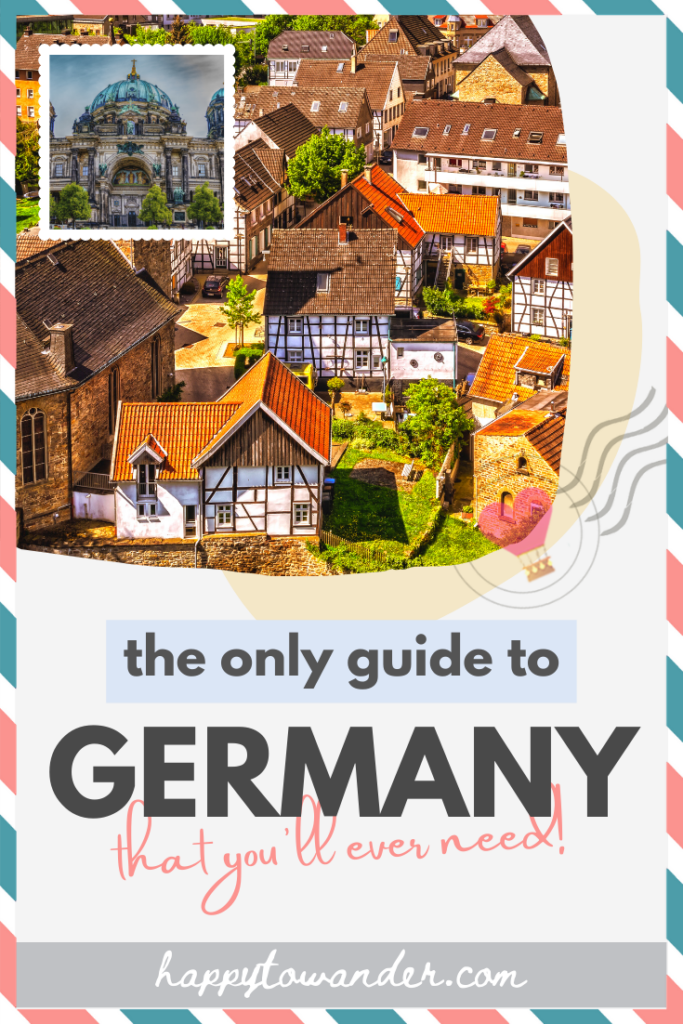
Save this Germany travel guide for later!
I promise it’ll come in handy!
I hope you find it helpful, and of course, feel free to ask any more questions in the comments section or on Instagram here.
Traveling to Germany Basics
Currency: Euro
Language: German, although accents and dialects vary wildly! In larger cities and tourist hotspots, most Germans also speak excellent English.
Getting Around: Trains, buses and flights are plentiful and affordable in Germany – my best tip is to use Omio to compare options easily. Having a car is ideal for visiting smaller towns, more remote locations and numerous destinations in a short amount of time, but is otherwise not needed for big cities.
Germany Highlights (By the Season)
- Winter: Christmas markets, skiing & alpine sports, Karneval and Fasching season (Carnival), Starkbier (Strong beer) season
- Spring: Cherry blossoms in Bonn , Frühlingsfest (Springfest) in Munich
- Summer: Hiking, Beer Garden season, summer festivals/celebrations
- Fall: Oktoberfest and other Volksfests, the world’s biggest pumpkin festival in Ludwigsburg, the Wurstmarkt (world’s largest wine festival)
My Favourite Places in Germany
Let’s get my mega-biased opinion out of the way first – Munich is the city I now call home, and I couldn’t recommend it more… especially if you’re obsessed with beer like I am. This is the birthplace of Oktoberfest after all!
There are lots of fun things to do in Munich , like hopping around the city’s sprawling museum district (many only cost 1 euro on Sundays!), eating up the best Bavarian food that Munich has to offer or soaking in the wealth of historical sites scatered around the city.
It’s also an ideal base for many epic day trips. Going from Munich to Neuschwanstein Castle (AKA the real life Sleeping Beauty castle) takes only 2.5 hours. Or, if you want to visit glorious Salzburg from Munich (AKA the birthplace of Mozart and setting of Sound of Music), that’s only 1 hour by train.
Why visit Munich when you travel Germany:
- Amazing beer & beer festivals
- The English Garden – one of the largest city parks in the world
- Beautiful palaces and museums
- Easy base for amazing day trips to the Alps
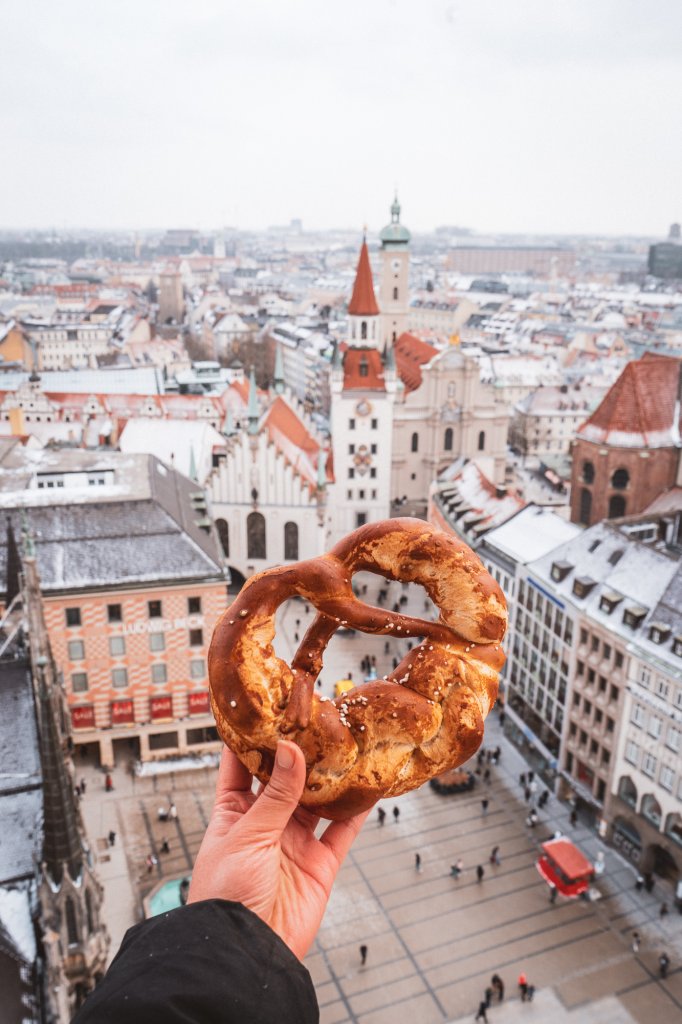
Berchtesgaden National Park
If it’s natural beauty you’re after, Germany’s Berchtesgaden National Park (near the border to Austria) is a must-visit.
Everything here is breathtaking – from the shimmering turquoise lakes and snow-flecked mountains to the adorable Berchtesgaden town center.
And, if you’re up for it, this is the ideal place to enjoy a typically Bavarian wellness weekend.
Why visit Berchtesgaden National Park when you travel Germany:
- Stunning hikes and scenery
- The glorious boat ride on Königssee to see the equally stunning Obersee
- Historic sights like Hitler’s Eagle’s Nest

Hands down one of my favourite places to visit time and time again is Berlin.
This endlessly fascinating city is home to incredible museums, delicious food, and a unique culture that makes it distinct from the rest of the country, despite its status as capital!
Whether you’re a history nerd, an avid partyer, or a famished foodie, Berlin has plenty to offer.
Why visit Berlin when you travel Germany:
- Fascinating history
- World-class museums and attractions
- A thriving nightlife and food scene
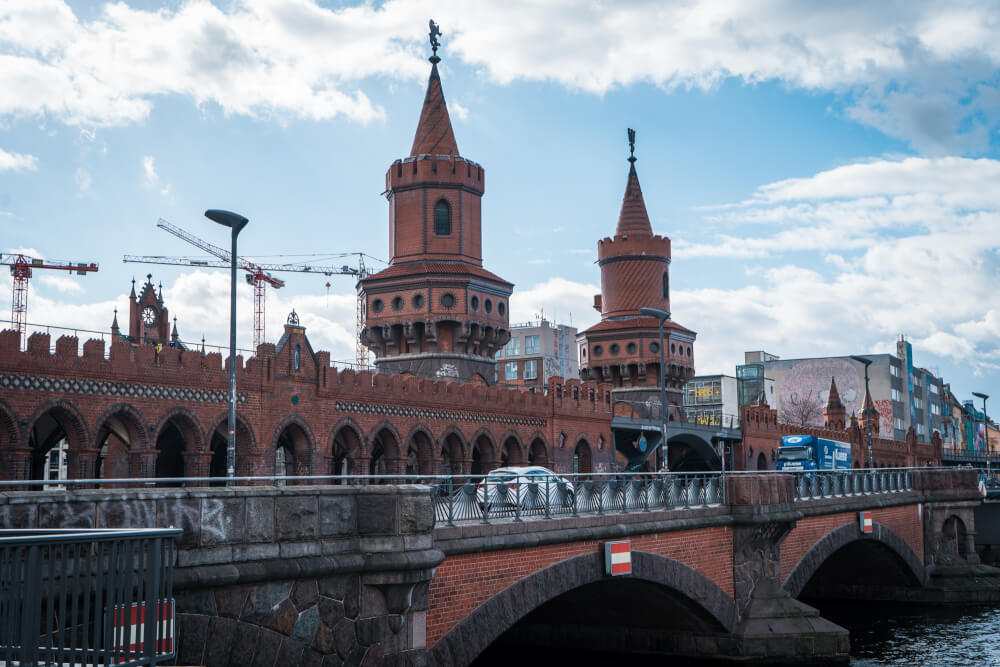
Franconia is a glorious region in northern Bavaria that is divided into Lower, Middle, and Upper Franconia.
To me, it’s one of the most underrated regions in Germany for international visitors, with an abundance of fairytale half-timbered houses, amazing beer, and unique natural landscapes.
Here are some places in Franconia that are absolutely worth visiting:
- Franconian Switzerland
- Würzburg (still haven’t been yet!)
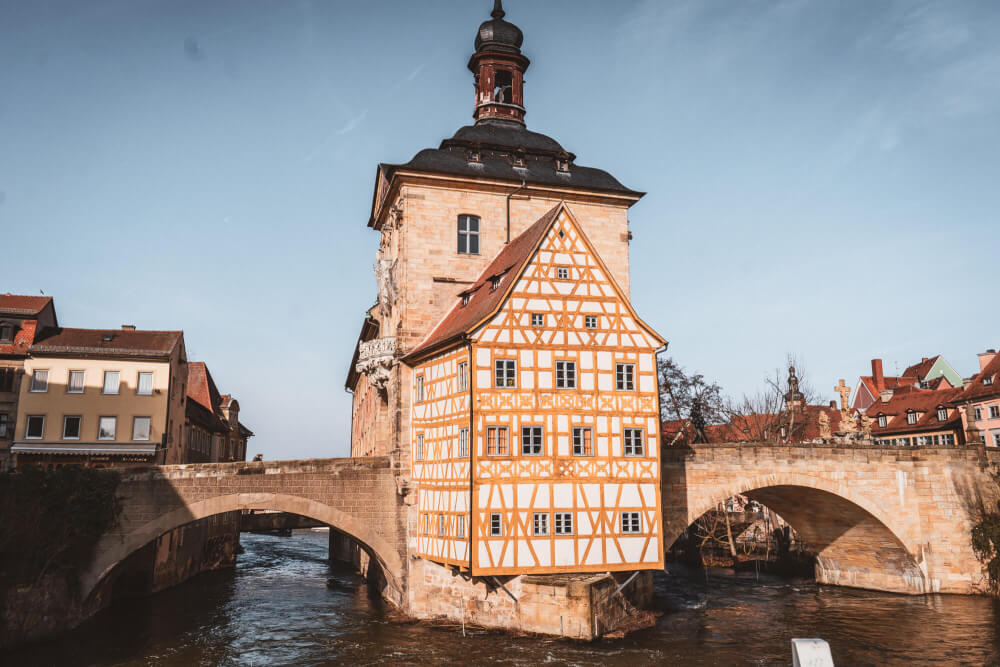
Perhaps the most idyllic entry of this list is Monschau, a sleepy but gorgeous village found near the border to Belgium.
I was lucky enough to come here for Christmas markets a few years ago, and I loved it so much, I skipped the train I’d pre-booked just so I could spend a few more hours there.
Picturesque half-timbered houses clustered around a roaring central river… oh, and a castle on a hill. Because of course they have one.
Why visit Monschau when you travel Germany:
- Super friendly locals
- Picture-perfect scenes at every turn
- Christina might cry if you don’t

Hamburg is an amazing city I’ve had the chance to visit a few times now. It’s a lifestyle city that reminds me a lot of my hometown, Vancouver.
Home to a mix of classic and modern architecture (including the coolest opera house in the world!), as well as Germany’s #1 attraction – the adorable Miniatur Wonderland, Hamburg has a lot to offer tourists, but perhaps the best way to enjoy it is with a nice beer and sunset along the Elbe.
Why visit Hamburg when you travel Germany :
- Amazing architecture like the Elbphilharmonie
- Fresh and tasty seafood (and a booming foodie scene!)
- A fun, vibrant vibe
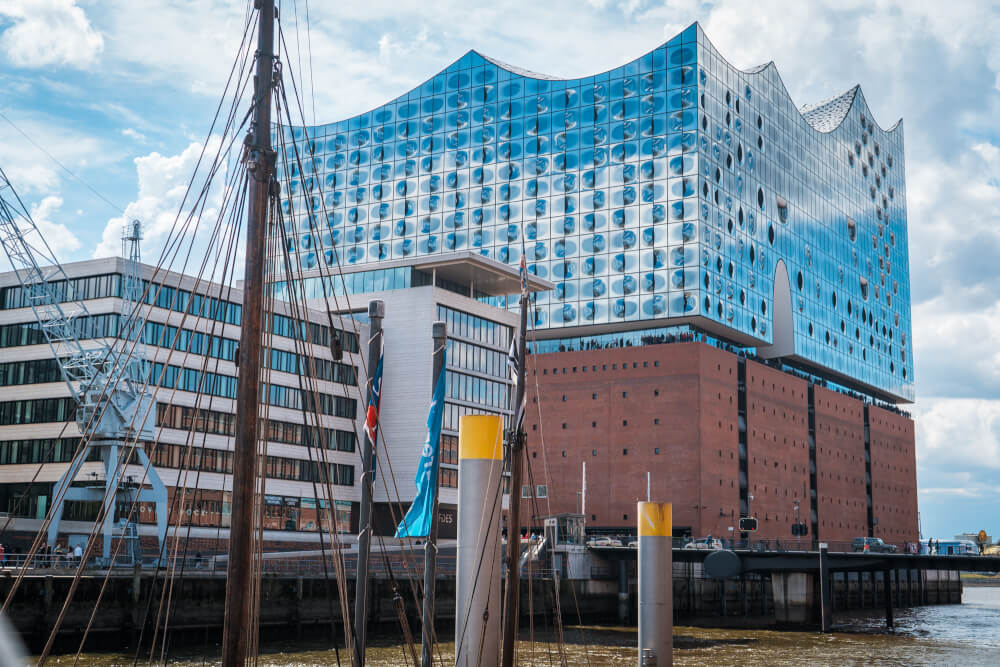
Dresden is one of the most beautiful cities in Germany, and its beauty is all the more astounding when we consider that much of the city was destroyed completely in WWII.
After decades of reconstruction however, Dresden once again shines with its former glory, establishing itself as one of the most important cultural hotspots in Germany.
… and all only a stone’s throw from Saxon Switzerland, one of the most beautiful natural wonders in the country!
Why visit Dresden when you travel Germany :
- Stunning architecture and sights
- World-class museums and culture scene
- Its jawdropping Christmas market (the oldest one in the country!)
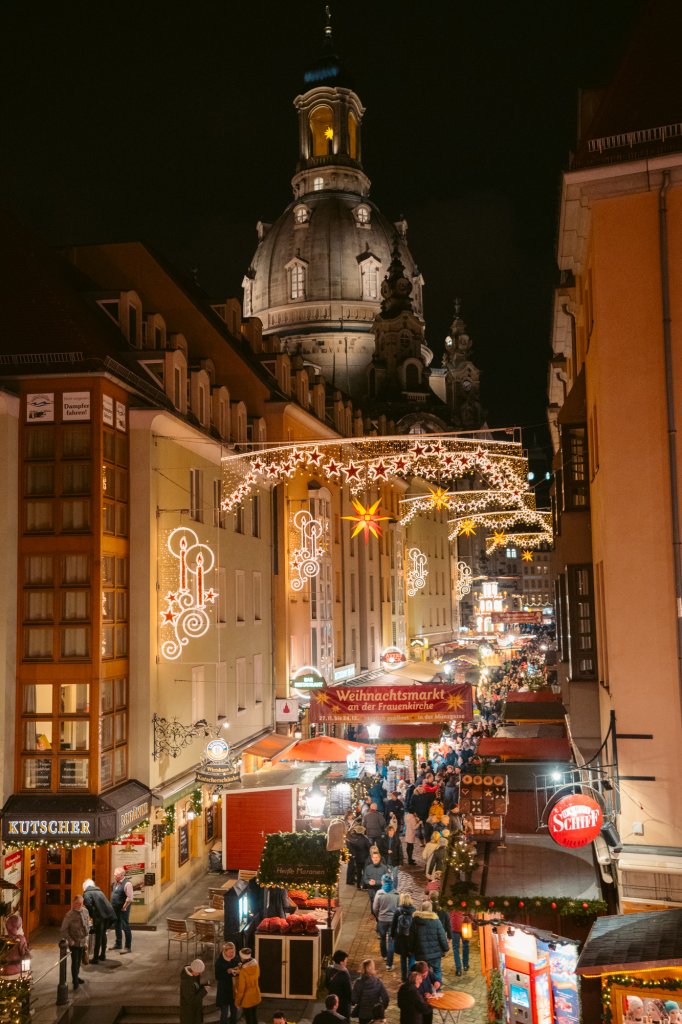
Stuttgart (and its Surrounding Area)
Stuttgart is the biggest city (and capital) of the German state Baden-Württemburg.
It’s perhaps best known as the ‘cradle of the automobile industry’, which explains why it’s home to not just one, but two car-centric museums: one belonging to Mercedes-Benz, and one to Porsche.
Besides cars though, the area around Stuttgart offers up some of the cutest small towns you can find in Germany, all easily reachable by public transport, meaning you get the best of all worlds during a visit here.
Why visit Stuttgart and the surrounding area when you travel Germany:
- Fairytale towns like Esslingen, Ludwigsburg, and Tübingen
- Stuttgart’s Stadtbibliothek, one of the most unique and beautiful libraries in the world
- Lots of fun events like Stuttgart’s Christmas Market and the Cannstatter Volksfest
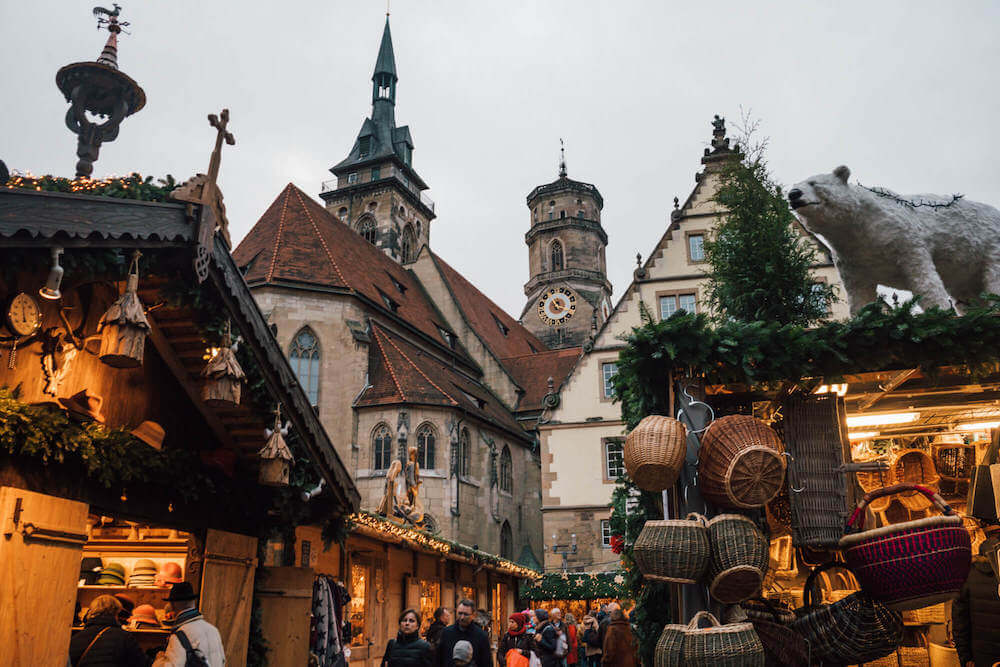
Thuringia is a state often overlooked by international tourists, but if you’re looking for a truly charming German escape, its capital Erfurt makes an excellent choice.
This beautiful city is famed for its unique Krämerbrücke, which is a gorgeous medieval bridge lined with residential buildings.
But that’s not all – there’s also an impressive cathedral, an imposing fortress, and surprises waiting on every corner… quite literally, because Erfurt is the HQ of the German children’s channel KiKA, and there’s plenty of fun statues of famous characters scattered around town.
Why visit Erfurt when you travel Germany:
- Krämerbrücke, the longest inhabited bridge in Europe
- Quirky and fun children’s channel sculptures all over the city
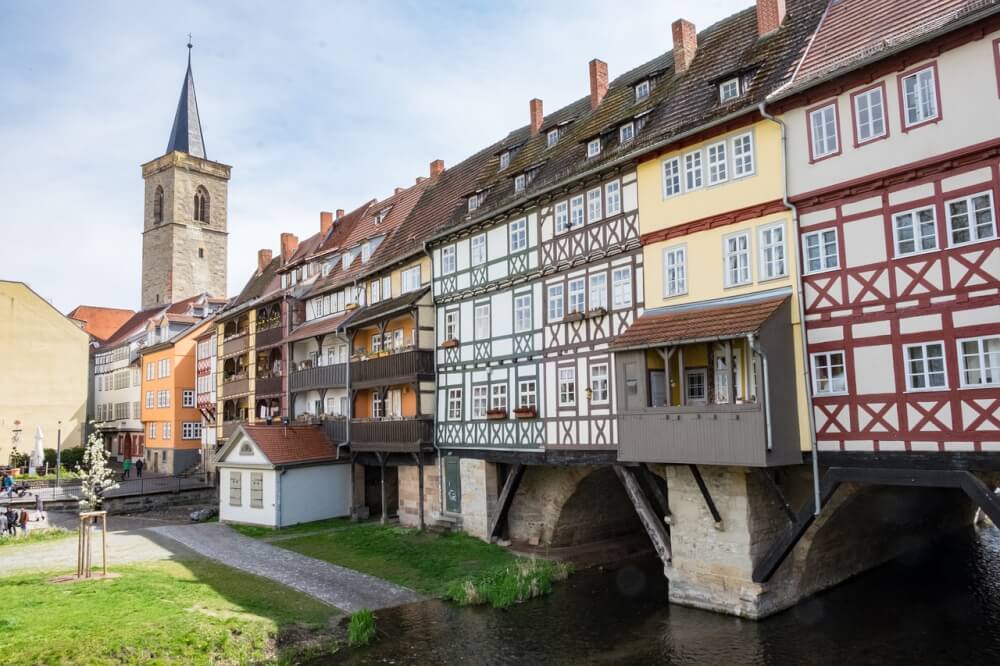
Cologne, to me, is a city synonymous with fun and celebration. While at first glance, it might not rank among the “prettiest” places to visit in Germany (much of it was destroyed in the war), it still boasts several impressive landmarks and sights, like the epic Cologne Cathedral.
Where Cologne really shines though is during special events – the Christmas markets here are some of the best I’ve been to in my entire life, and the Karneval celebrations… well, those are truly epic!
Why visit Cologne when you travel Germany:
- Bucket list events like the Cologne Christmas Market and Kölner Karneval
- The iconic Kölner Dom (Cologne Cathedral), one of the most famous churches in the world
- Fun-loving locals who are among the friendliest I’ve ever encountered in Germany
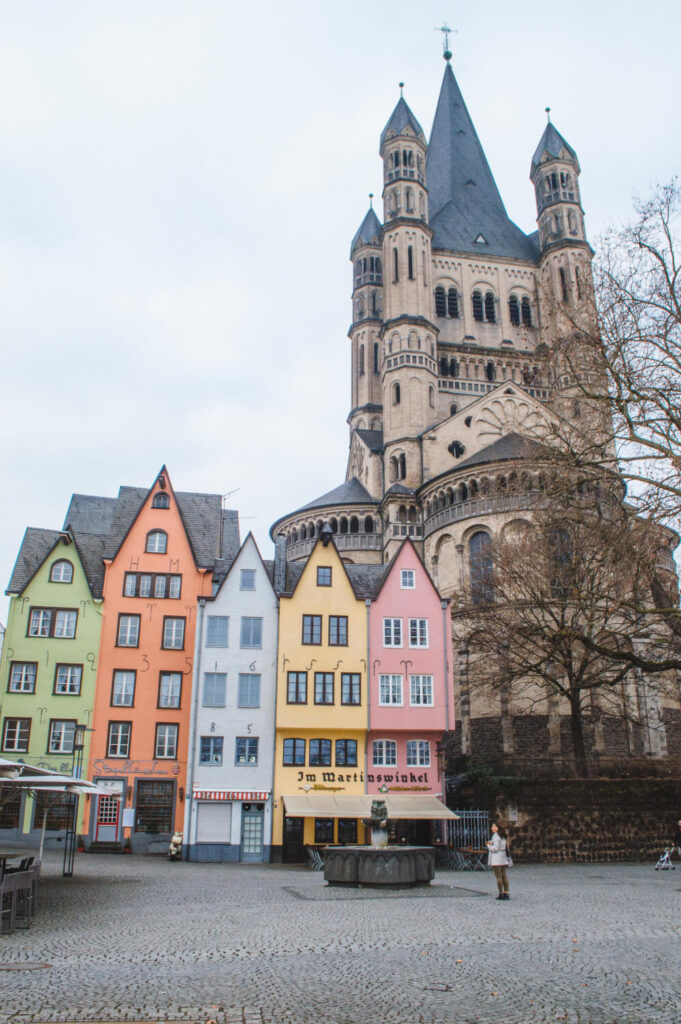
Last but not least, we have Hannover, a city which (in my opinion) is one of the most underrated cities in Germany where tourism is concerned.
Locally, people often joke that Hannover is one of the most boring cities in Germany, but I don’t think that’s true at all. One quick look and you’ll find a stunning palace within the city, an architecturally impressive Town Hall (with a unique elevator offering epic views), and a cool laidback vibe that many compare to what Berlin was like decades ago.
Here are some awesome things to do in Hannover.
Why visit Hannover when you travel Germany:
- Its gorgeous New Town Hall
- The stunning Herrenhausen Palace and its gardens
- A fun, laidback city vibe

Bucket List Experiences in Germany
Germany is full of incredible bucket list experiences. Here are a few of my favourites:
Christmas Markets
German Christmas markets are the stuff of bucket list dreams.
If you adore Christmas, a German Xmas market trip needs to make it on your bucket list, because nobody captures Christmas coziness and joy quite like the Germans do.
The best part (besides the droolworthy assortment of German Christmas Market foods ) is that you’ll find Christmas markets in just about every city, town, and even the smallest of villages, each with their own unique take on traditions.
Trust me, you could never get bored of visiting these.
Here are some full guides to the Christmas markets I’ve visited in Germany:
- Munich’s Christmas Markets
- Berlin’s Christmas Markets
- Cologne’s Christmas Markets
- Esslingen Christmas Market
- Ludwigsburg Christmas Market
- Karlsruhe Christmas Market
- Düsseldorf Christmas Market
- Nuremberg Christmas Market
- Essen Christmas Market

Oktoberfest
Trust me – Oktoberfest , AKA the world’s largest beer festival, is reason enough to make a trip to Germany.
Typically celebrated annually in Munich, this is one of the most incredible events in the world, with millions of people attending, millions of beer served, and a guaranteed recipe for making memories to last a lifetime.
… If you can remember anything after 5L of beer that is.
Read my full Oktoberfest guide for more details.

Visiting Fairytale Castles
If you love castles, I recommend avoiding Germany……. because you might just combust from sheer fangirl joy.
Seriously, Germany is every castle lover’s kryptonite, with elegant palaces and fairytale castles in the thousands. If you’re a Disney gal like me who grew up dreaming of happily ever afters, pack a ballgown and head to Germany ASAP.
I promise you won’t be disappointed.
Here are some castles that you must visit in Germany:
- Neuschwanstein Castle
- Nuremberg Castle

The Cherry Blossoms in Bonn
The cherry blossoms in Bonn (also the birthplace of Beethoven and gummy bear legend, Haribo) are absolutely spectacular, and 100% worth visiting in Spring time. In fact, I’d even say they’re one of the best things to see in Europe at Spring time.
Yes, you, too, can come frolic in these tunnels of pink! Here is my guide on where to find cherry blossoms in Bonn.

Karneval, Fasching, Etc.
Carnival Season is one of the best times to visit Germany if you’re looking for a party.
The grandest celebrations take place just before Lent, and are celebrated throughout the country, although the festivites in North-Rhine Westphalia are probably the best known.
My top recommendation? Go celebrate in Cologne, where the Kölner Karneval draws millions of visitors every year.
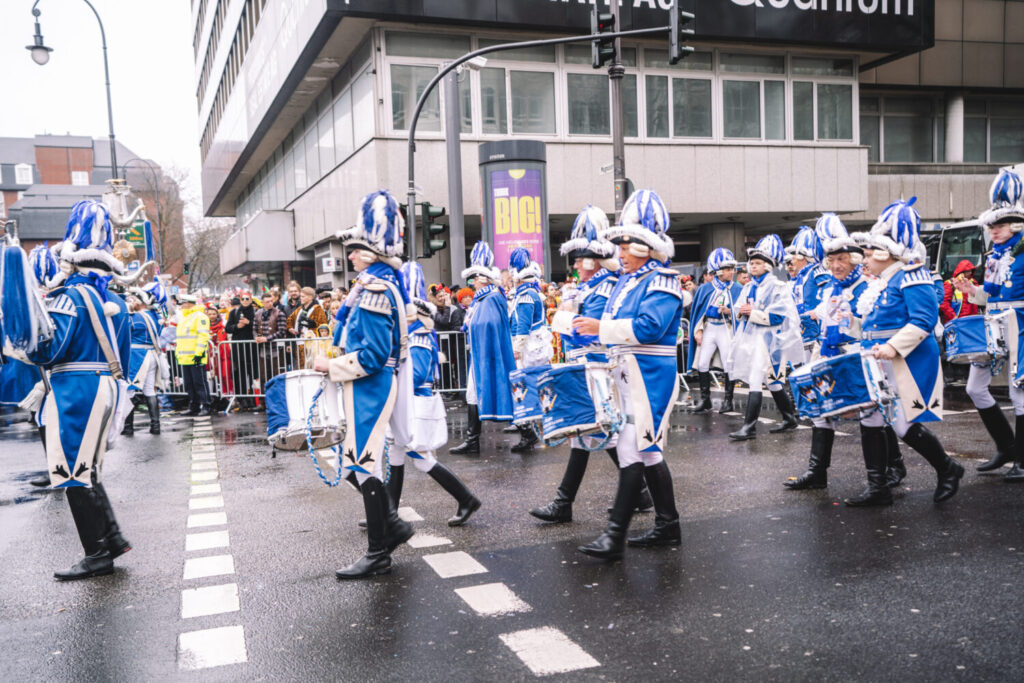
My Recommended Germany Itineraries
Germany is a huge country with a massive diversity in sights… so how can you organize your time efficiently and make the most of your trip? Here are some German trip itinerary ideas…
Germany itinerary ideas for a taste of everything:
- Southern Germany Classic: Munich, the Allgäu (for Castles!), Garmisch Partenkirchen, Berchtesgaden National Park, Stuttgart & Area, Black Forest
- Eastern Germany Classic: Berlin, Dresden, Saxon Switzerland
- Western Germany Classic: Aachen, Monschau, Eifel National Park
- Northern Germany Classic: Hamburg, Bremen , Lübeck, Kiel, Sylt
- The Rhine River Classic: Mainz, Koblenz, Burg Eltz, Cochem, Bonn, Cologne, Düsseldorf
- The Harz Mountains Experience: Harz Mountains, Goslar, Wernigerode, Quedlinburg

Germany itinerary ideas for city breakers and culture hunters:
- The Big City Tour: Berlin and Munich (a 4 hour express train connects them)
- The BaWu Special: Stuttgart, Ludwigsburg, Tübingen, Esslingen, Heidelberg
- The Bavaria Special: Munich, Nuremberg, Bamberg, Würzburg, Bayreuth
- The Saxony Special: Leipzig, Görlitz, Dresden
- The Rhine City Hop: Bonn, Cologne, Düsseldorf
- The Romantic Villages Hop: Würzburg, Dinkelsbühl, Nördlingen, Rothenburg ob der Tauber, Füssen
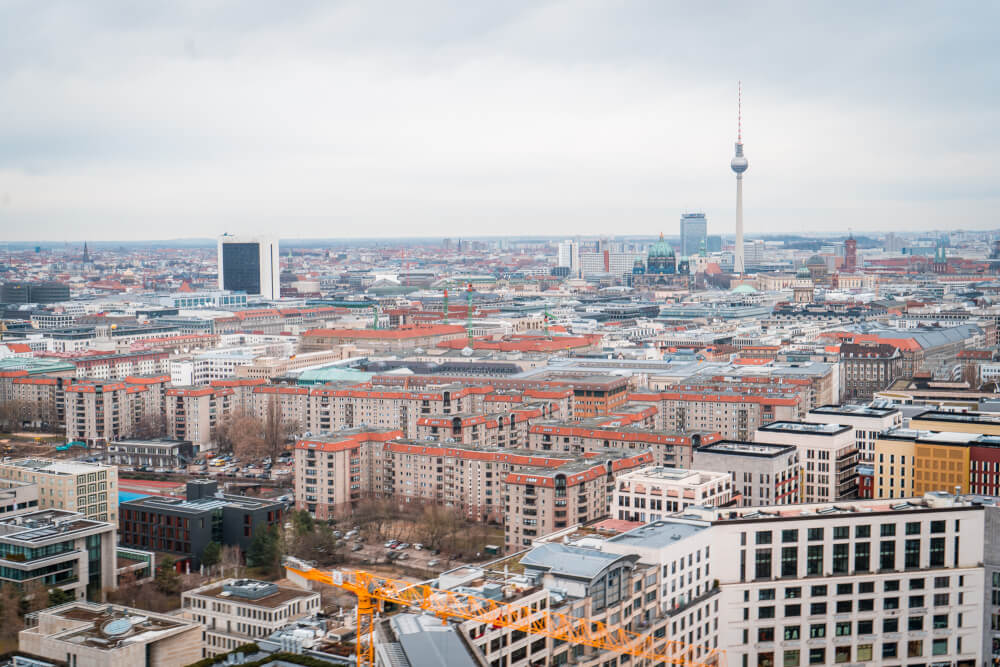
Germany itinerary ideas for nature lovers:
- Southern Germany Nature Itinerary: Berchtesgaden National Park, Garmisch-Partenkirchen, the Black Forest and Lake Constance (Bodensee)
- Bavaria’s Best Nature Itinerary: Berchtesgaden National Park, Garmisch-Partenkirchen, Munich’s Lake Region, Franconian Switzerland, Danube Gorge
- Eastern Germany Nature Itinerary: Dresden and Saxon Switzerland National Park
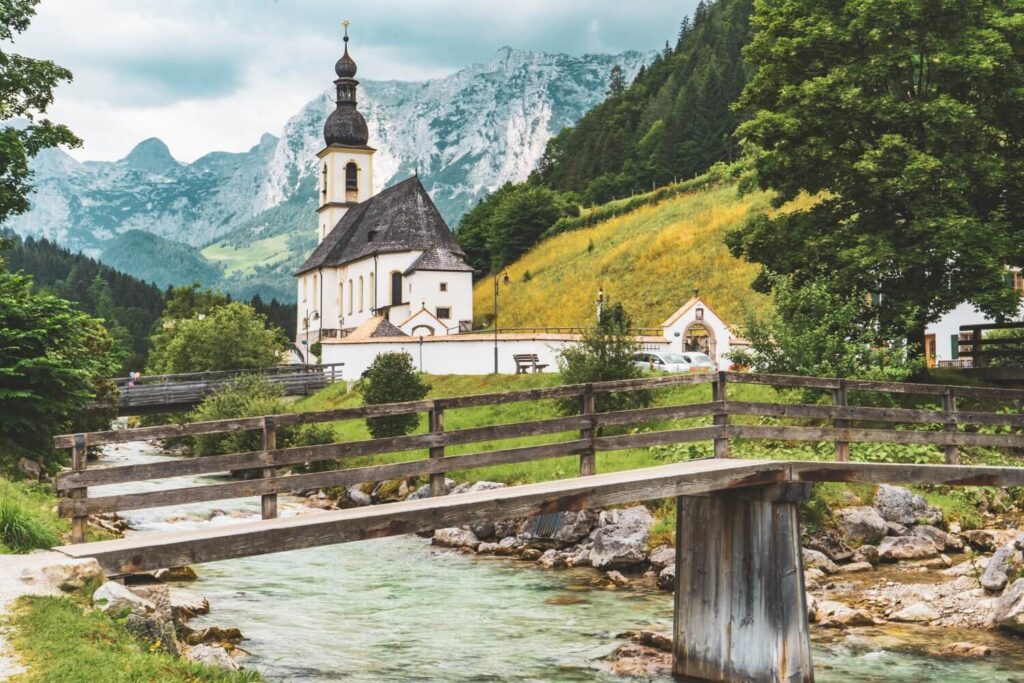
My Top Germany Travel Tips
- If you’re overwhelmed by transport options, Omio is a great resource for comparing trains, buses and flights in Germany at the same time.
- If travelling by train, look into group discount tickets like the Bayern Ticket which give you unlimited train travel for one day on regional trains. It can save you a TON of money.
- If you are traveling to multiple countries nearby (i.e. Switzerland), a Eurail pass might save you money.
Accommodation:
- Booking.com is a great place to search up hotels, and filtering by Free Cancellation allows you to book without paying upfront
- Airbnb can be a very affordable alternative for longer stays/bigger groups
Attractions and Tickets:
- GetYourGuide is a great site for finding tours and attraction tickets
- City passes like the Munich City Pass , Berlin Pass , and the Cologne Card can save you a LOT of money if you plan to visit many tourist attractions in a short time
- If you’re trying to find specific info about a place, try using Google Translate to search in German because German versions of sites always have more info
If you’re past the planning stage and heading to Germany soon, make sure you read this before you go:
- Hilarious must-knows before you visit Germany
More Germany Travel Reads
Feeling inspired to visit Germany after reading all that?
As you can (probably) tell, I’ve written extensively about Germany.
So, here are some more articles that might pique your interest:
- Unique Things to do in Germany (That You Can’t Do Anywhere Else)
- The Best Christmas Markets in Germany
- Hilarious Must-Knows Before You Visit Germany
My Go-To Travel Favourites:
🧳 Eagle Creek: My favourite packing cubes
💳 Wise: For FREE travel friendly credit cards
🍯 Airalo: My go-to eSIM
🏨 Booking.com: For searching hotels
📷 Sony A7IV: My (amazing) camera
✈️ Google Flights : For finding flight deals
🌎 WorldNomads: For travel insurance
🎉 GetYourGuide: For booking activities
4 thoughts on “The Only Germany Travel Guide You’ll Ever Need”
i found myself reading almost every post in your website for days and days and i ABSOLUTELY LOVE IT and adore and thank you for spending so much time and effort to make it so helpful, informative and fun to read. you have helped me plan my trip to munich in december and i cant wait to visit just because of your enthusiasm 🙂
We would like to Thank you for sharing such a beautiful blog! Very informative.
This Germany Travel Guide truly captures the multifaceted beauty of Deutschland, a country that has something to offer to everyone, from culture enthusiasts to nature lovers. Your personal anecdotes from living in Munich make it come alive, making me yearn for a taste of that amazing beer you’ve mentioned, and a wander around the English Garden! The varied seasonal highlights emphasize how Germany is a year-round destination, offering uniquely charming experiences, from the festive winter Christmas markets to the lively summer festivals. It’s heartening to know that navigating around the country is convenient, making it possible to explore its picturesque small towns and vibrant cities. This guide is a treasure trove for anyone planning to travel to Germany – it gives a well-rounded view of the country, infused with personal insights, which makes it even more valuable. I’m particularly intrigued to visit Munich, the city you so passionately call home.
As a Berliner, I can’t agree more with this guide. Germany truly is a delightful mix of tradition and innovation, natural beauty and urban charm, hearty cuisine and diverse cultures. Moving around in Germany is indeed quite convenient thanks to the well-organized public transportation system, including trains, buses, and trams. And yes, English is widely spoken in major cities, so communication shouldn’t be a problem for travelers. As for the varied dialects across regions, it just adds to the unique charm of exploring this beautiful country. Safe travels, fellow adventurers!
Leave a Comment Cancel reply
By using this form you agree with the storage and handling of your data by this website. *
Situation in Haiti April 13, 2024
U.s. citizens in haiti, update april 12, 2024, information for u.s. citizens in the middle east.
- Travel Advisories |
- Contact Us |
- MyTravelGov |
Find U.S. Embassies & Consulates
Travel.state.gov, congressional liaison, special issuance agency, u.s. passports, international travel, intercountry adoption, international parental child abduction, records and authentications, popular links, travel advisories, mytravelgov, stay connected, legal resources, legal information, info for u.s. law enforcement, replace or certify documents.
Before You Go
Learn About Your Destination
While Abroad
Emergencies
Share this page:
Travel Advisory July 26, 2023
Germany - level 2: exercise increased caution.
Reissued with obsolete COVID-19 page links removed.
Exercise increased caution in Germany due to terrorism .
Country Summary: Terrorist groups continue plotting possible attacks in Germany. Terrorists may attack with little or no warning, targeting tourist locations, transportation hubs, markets/shopping malls, local government facilities, hotels, clubs, restaurants, places of worship, parks, major sporting and cultural events, educational institutions, airports, and other public areas.
Read the country information page for additional information on travel to Germany.
If you decide to travel to Germany:
- Be aware of your surroundings when traveling to tourist locations and crowded public venues.
- Follow the instructions of local authorities.
- Monitor local media for breaking events and adjust your plans based on new information.
- Enroll in the Smart Traveler Enrollment Program ( STEP ) to receive Alerts and make it easier to locate you in an emergency.
- Follow the Department of State on Facebook and Twitter .
- Review the Country Security Report for Germany.
- Visit the CDC page for the latest Travel Health Information related to your travel.
- Prepare a contingency plan for emergency situations. Review the Traveler’s Checklist .
Embassy Messages
View Alerts and Messages Archive
Quick Facts
Three months beyond planned date of departure from the Schengen area including transit (strictly enforced) .
Not required for stays under 90 days.
10,000€ (euros or equivalent).
Embassies and Consulates
U.S. EMBASSY BERLIN Clayallee 170 14191 Berlin Federal Republic of Germany Telephone: +(49) (30) 8305-0 Email: [email protected]
U.S. CONSULATE GENERAL FRANKFURT Giessener Str. 30 60435 Frankfurt am Main Federal Republic of Germany Telephone: +(49) (69) 7535-0 Fax: +(49) (69) 7535-2252 Passport, Consular Report of Birth Abroad, and Citizenship: [email protected] All other questions: [email protected]
U.S. CONSULATE GENERAL MUNICH Koeniginstrasse 5 80539 Munich Federal Republic of Germany Telephone: +(49) (89) 2888-575 Emergency After-Hours Telephone: +(49) 89-2888-0 Fax: If you need to send a fax, please email first to obtain a one-time use fax number. Email: [email protected]
U.S. CONSULATE GENERAL DUSSELDORF Willi-Becker-Allee 10 40227 Duesseldorf Federal Republic of Germany Telephone: +(49) (211) 788-8927 Emergency After-Hours Telephone: +(49) (30) 8305-0 Fax: +(49) (211) 788 - 8938 Consular services are provided through the U.S. Consulate in Frankfurt.
U.S. Consulate General Hamburg Alsterufer 27/28 20354 Hamburg Federal Republic of Germany Telephone: +(49) (40) 411-71-100 Emergency After-Hours Telephone: Contact the U.S. Embassy in Berlin: +(49) (30) 8305-0 Fax: +(49) (40) 411-71-222 Consular services are provided through the U.S. Embassy in Berlin.
U.S. Consulate General Leipzig Wilhelm-Seyfferth-Str. 4 04107 Leipzig Federal Republic of Germany Telephone: +(49) (341) 213-84-0 Emergency After-Hours Telephone: Contact the U.S. Embassy in Berlin: +(49) (30) 8305-0 Fax: +(49) (341) 213-84-75 Consular services are provided through the U.S. Embassy in Berlin.
Destination Description
See the Department of State’s Fact Sheet on Germany for information on U.S. - Germany relations.
Entry, Exit and Visa Requirements
Traveling Through Europe : If you are planning to visit or travel through European countries, you should be familiar with the requirements of the Schengen Agreement.
- Your passport should be valid for at least three months beyond the period of stay if you plan on transiting a Schengen country review our U.S. Travelers in Europe page .
- You will need s ufficient proof of funds and a return plane ticket .
- For additional information about visas for the Schengen area, see the Schengen Visa page.
- For transit through Germany to another Schengen country, passports must be valid for three months beyond the length of your visit to Europe.
Credit cards are not as widely accepted in Germany as they are in the United States; however, ATMs are widely available throughout Germany.
Carry identification with you at all times.
The U.S. Department of State is unaware of any HIV/AIDS entry restrictions for visitors to or foreign residents of Germany.
Find information on dual nationality , prevention of international child abduction and customs regulations on our websites.
Safety and Security
Terrorism:
Credible information indicates terrorist groups continue plotting possible attacks in Europe. European governments are taking action to guard against terrorist attacks; however, all European countries remain potentially vulnerable to attacks from transnational terrorist organizations.
Terrorist groups and those inspired by such organizations are intent on attacking U.S. citizens abroad. Terrorists are increasingly using less sophisticated methods of attack –including knives, firearms, and vehicles – to more effectively target crowds. Frequently, their aim is unprotected or vulnerable targets, such as:
- High-profile public events (sporting contests, political rallies, demonstrations, holiday events, celebratory gatherings, etc.)
- Hotels, clubs, and restaurants frequented by tourists
- Places of worship
- Schools
- Shopping malls and markets
- Public transportation systems (including subways, buses, trains, and scheduled commercial flights)
For more information, see our Terrorism page.
Demonstrations:
Demonstrations occur regularly in Germany. Large, public demonstrations take place for a variety of political and economic issues. Demonstrations tend to take place on politically significant holidays like German Labor Day (May 1) and during international summits hosted in Germany. Demonstration organizers must obtain prior police approval, and police routinely oversee participants.
- Even demonstrations intended to be peaceful can turn confrontational and possibly become violent.
- Avoid areas around protests and demonstrations.
- Check local media for updates and traffic advisories.
International Financial Scams:
Internet romance and financial scams are prevalent in Germany. Scams are often initiated through Internet postings/profiles or by unsolicited emails and letters. Scammers almost always pose as U.S. citizens who have no one else to turn to for help. Common scams include:
- Romance/Online dating
- Transit flight issues related to romance scams
- Immigration, and Detention issues related to romance scams
See the Department of State and the FBI pages for information.
Violent crime is rare in Germany, but can occur, especially in larger cities or high-risk areas such as on large metropolitan subway systems and in train stations, primarily during late night or early morning hours. Most incidents of street crime involve the theft of unattended items and pickpocketing. Theft and pickpocketing primarily take place at train stations, on public transportation, at tourist attractions, and at large public events. Always pay close attention to your valuables!
Be cautious and aware of your surroundings.
U.S. citizens should exercise caution when congregating in known expatriate hangouts.
Hooligans, most often drunken “skinheads,” have harassed and attacked perceived foreigners or members of rival groups. Seemingly racially motivated assaults (because of a “foreign” appearance) against U.S. citizens have occurred.
Don’t buy counterfeit and pirated goods, even if they are widely available. They are illegal to bring back into the United States, and you could also be breaking local law.
Victims of Crime:
Report crimes to the local police: in an emergency dial 112 for ambulance and 110 for the police and contact the U.S Embassy or nearest U.S. Consulate (see contact details above) .
Remember that local authorities are responsible for investigating and prosecuting crimes.
See our webpage on help for U.S. victims of crime overseas .
We can:
- Help you find appropriate medical care
- Assist you in reporting a crime to the police
- Contact relatives or friends with your written consent
- Provide general information regarding the victim’s role during the local investigation and following its conclusion
- Provide a list of local attorneys
- Provide information on victim’s compensation programs in the U.S.
- Provide information on victim’s compensation and support in Germay
- Provide an emergency loan for repatriation to the United States and/or limited medical support in cases of destitution
- Help you find accommodation and arrange flights home
- Replace a stolen or lost passport
We also maintain information on our website on how to report child abuse situations to the local authorities.
Domestic Violence:
U.S. citizen victims of domestic violence may contact the Embassy or the Consulates in Frankfurt or Munich for assistance. Call 110 if you are in immediate danger.
The tourism industry is generally regulated and rules are regularly enforced. Hazardous areas/activities are identified with appropriate signage and professional staff is typically on hand in support of organized activities.
Germany sometimes experiences extreme weather conditions including floods, long periods of drought, and unusually harsh winters with vast amounts of snow even in urban areas. Numerous injuries and deaths occur every year in Germany’s Alpine and coastal regions. Most of the emergencies relate to the following sports: skiing, hiking, snowboarding, mountain biking, sledding, rock and mountain climbing, paragliding, and swimming. Those engaging in Alpine sports are strongly encouraged to register with German “Alpen Verein” .
In the event of an injury, appropriate medical treatment is widely available throughout the country. Outside of a major metropolitan center, it may take more time for first responders and medical professionals to stabilize a patient and provide life-saving assistance.
U.S. citizens are encouraged to purchase medical evacuation insurance .
Local Laws & Special Circumstances
Criminal Penalties: You are subject to local laws. If you violate local laws, even unknowingly, you may be expelled, arrested, or imprisoned. Individuals establishing a business or practicing a profession that requires additional permits or licensing should seek information from the competent local authorities, prior to practicing or operating a business.
Furthermore, some laws are also prosecutable in the U.S., regardless of local law. For examples, see our website on crimes against minors abroad and the Department of Justice website.
Arrest Notification: If you are arrested or detained, ask police or prison officials to notify the U.S. Embassy or nearest U.S. Consulate immediately. See our webpage for further information.
Special Circumstances: Germany has strict customs regulations concerning:
- Temporary importation or exportation of firearms
- Military artifacts (particularly those of World War II)
- Medications/pharmaceuticals
- Business equipment
Under German law it is also illegal to bring into or take out of Germany any literature, music, or paraphernalia that glorifies fascism, the Nazi past, or the “Third Reich.”
Contact the German Embassy in Washington or one of the German consulates in the United States for specific information regarding customs requirements.
Faith-Based Travelers : See our following webpages for details:
- Faith-Based Travel Information
- International Religious Freedom Report – see country reports
- Human Rights Report – see country reports
- Hajj Fact Sheet for Travelers
- Best Practices for Volunteering Abroad
LGBTI Travelers : There are no legal restrictions on same-sex sexual relations or the organization of LGBTI events in Germany. Same-sex marriage is available in Germany. The LGBTI community is protected by federal anti-discrimination laws and LGBTI Pride events are officially encouraged by most large city governments, including those in Berlin, Cologne, Hamburg, Frankfurt, and Munich.
See our LGBTI Travel Information page and section 6 of our Human Rights report for further details.
Travelers with Disabilities:
The law in Germany prohibits discrimination against persons with disabilities, and the law is enforced. Social acceptance of persons with disabilities in public is as prevalent as in the United States. The law in Germany prohibits discrimination against persons with disabilities, and the law is enforced. Social acceptance of persons with disabilities in public is as prevalent as in the United States. Expect accessibility to be limited in some older public transportation, lodging, and general infrastructure especially outside major cities, but common in most urban infrastructure. Some older buildings and public transportation systems are less adapted to individuals with disabilities.
Check your hotel or destination to learn more about options to accommodate disabled traveler needs before visiting Germany.
The German National Tourist Board maintains information about accessibility and disability-friendly travel .
All German airports and Lufthansa offer services for disabled travelers.
The German National Railway, Deutsche Bahn , maintains a mobility resource webpage.
Students: See our Students Abroad page and FBI travel tips .
Women Travelers: See our travel tips for Women Travelers .
COVID-19 Vaccines: The German government has authorized several vaccines , including the Pfizer/BioNTech, Moderna, Astra Zeneca, Janssen/Johnson & Johnson, and Novavax vaccines. Visit the FDA's website to learn more about FDA-approved vaccines in the United States.
Germany has generally high-quality medical care and facilities. Prescript ion and over-the-counter medicines are widely available although brands and drug names differ from those available in the United States.
For emergency services in Germany, dial 112.
Ambulance services are widely available.
Payment for medical services in Germany:
We do not pay medical bills. Be aware that U.S. Medicare does not apply overseas. Most hospitals and doctors overseas do not accept U.S. health insurance. If you are not a resident of Germany, doctors and hospitals may expect immediate payment in cash. Credit card payment is not always available.
Medical Insurance: Make sure your health insurance plan provides coverage overseas or purchase travel insurance for this purpose. Most care providers overseas only accept cash payments. See our webpage for more information on insurance coverage overseas. Visit the U.S. Centers for Disease Control and Prevention for more information on type of insurance you should consider before you travel overseas. We strongly recommend supplemental insurance to cover medical evacuation.
The U.S. Embassy and Consulates maintain lists of doctors and medical services in Germany . We do not endorse or recommend any specific medical provider or clinic.
Medical Tourism and Elective Surgery
- Medical tourism is a rapidly growing industry. People seeking health care overseas should understand that medical systems operate differently from those in the United States and are not subject to the same rules and regulations. Anyone interested in traveling for medical purposes should consult with their local physician before traveling and visit the U.S. Centers for Disease Control and Prevention website for more information on Medical Tourism.
- Visit the U.S. Centers for Disease Control and Prevention website for information on Medical Tourism, the risks of medical tourism, and what you can do to prepare before traveling to Germany.
- We strongly recommend supplemental insurance to cover medical evacuation in the event of unforeseen medical complications.
Pharmaceuticals
- If traveling with prescription medication, visit the German customs website to ensure the medication is legal in Germany. For medications that Germany classifies as narcotics, you may only carry a 30-day supply. A comprehensive list of these medications can be found here. If your medication is on that list, there is an additional requirement for your doctor to complete a certification form . You will see part E asks for the endorsement of an “issuing authority.” As there is no such authority in the United States, travelers may have the doctor self-certify the form and enter the information of his or her practice in part E, ideally with a stamp or seal from their office. Due to Germany’s strict customs regulations, you are not allowed to receive prescription medication by mail without special permission. Always, carry your prescription
- Exercise caution when purchasing medication overseas. Medication should be purchased in consultation with a medical professional and from reputable establishments.
- U.S. Customs and Border Protection and the Food and Drug Administration are responsible for rules governing the transport of medication back to the United States. Medication purchased abroad must meet their requirements to be legally brought back into the United States. Medication should be for personal use and must be approved for usage in the United States. Please visit the U.S. Customs and Border Protection and the Food and Drug Administration websites for more information.
Assisted Reproductive Technology and Surrogacy
If you are considering traveling overseas to have a child through use of assisted reproductive technology (ART) or surrogacy, please see our ART and Surrogacy Abroad page .
- All surrogacy arrangements, as well as IVF procedures involving the use of donated eggs, are illegal in Germany. For additional information, see this webpage of the German Foreign Ministry (German language only).
Vaccinations: Be up-to-date on all vaccinations recommended by the U.S. Centers for Disease Control and Prevention.
Further health information:
- World Health Organization
- U.S. Centers for Disease Control and Prevention (CDC)
Adventure Travel: Visit the U.S. Centers for Disease Control and Prevention website for more information about Adventure Travel .
Travel and Transportation
Road Conditions and Safety: Road conditions in general are excellent but can differ from those in the United States, but driver error is a leading cause of accidents involving U.S. citizen motorists in Germany.
If you hold a valid U.S. driver’s license you can drive in Germany for up to six months without acquiring a German driver’s license. Many German traffic laws and traffic signs differ significantly from those in the United States. For more information, please visit the U.S. embassy’s webpage on driving in Germany .
Speed limits are posted on large stretches of the highway, on the Autobahn in urban areas and when the road has many curves. While high speeds are permitted on the Autobahn, adverse weather conditions and unfamiliar road markings pose significant hazards. Speed limits are strictly enforced. Use of seat belts is mandatory in front and back seats. Do not park on bike paths or sidewalks. Your vehicle registration, insurance policy, a first-aid kit, a reflective vest and a reflective triangle must be in your vehicle at all times. In snowy or icy conditions, your vehicle must have snow tires or all-season tires (indicated by M+S marking) or you will be subject to a fine.
Bicycles: German streets and sidewalks have dedicated bike lanes. Bicycles have priority use of bike lanes over pedestrians and automobiles. Bicyclists also have priority over cars when turning onto side streets. If you are driving, check whether a bicyclist is approaching from either direction before attempting to enter side streets, even when the light is in your favor. You will be held responsible for any injury or damage caused if you turn into a side street and hit a bicyclist using a marked bike lane. If you are walking, watch for bicyclists before crossing or stepping into bike lanes.
Traffic Laws: If you are involved in a traffic accident in Germany, even a minor fender-bender, you MUST stay with your vehicle and do not leave the scene until police arrive to take a report. It is illegal to use your cell phone while driving in Germany. Except on priority roads, vehicles coming from the right have the right-of-way. It is generally illegal in Germany to pass vehicles on the right. Germans strictly observe the ‘slower traffic keep right’ rule. It is illegal to operate a vehicle if your blood alcohol level is 0.05% or higher. You may be fined and your driver’s license may be suspended for specified periods of time depending upon the gravity of each violation.
Public Transportation: Germany has an extensive and safe public transportation network consisting of buses, streetcars, trains, and subways. Metered taxis are also prevalent throughout Germany, although some taxis do not accept credit cards. Uber and other rideshare companies are available in most cities in Germany. Use common sense safety practices such as guarding valuables and remaining aware of your surroundings on all public transportation.
See our Road Safety page for more information. Visit the website of Germany’s Federal Ministry for Digital and Transport (BMVI) , the national authority responsible for road safety.
Aviation Safety Oversight: The U.S. Federal Aviation Administration (FAA) has assessed the government of Germany’s Civil Aviation Authority as compliant with International Civil Aviation Organization (ICAO) aviation safety standards for oversight of Germany’s air carrier operations. Further information may be found on the FAA’s safety assessment page .
Maritime Travel: Mariners planning travel to Germany should also check for U.S. maritime advisories and alerts . Information may also be posted to the U.S. Coast Guard homeport website , and the NGA broadcast warnings .
For additional travel information
- Enroll in the Smart Traveler Enrollment Program (STEP) to receive security messages and make it easier to locate you in an emergency.
- Call us in Washington, D.C. at 1-888-407-4747 (toll-free in the United States and Canada) or 1-202-501-4444 (from all other countries) from 8:00 a.m. to 8:00 p.m., Eastern Standard Time, Monday through Friday (except U.S. federal holidays).
- See the State Department’s travel website for the Worldwide Caution and Travel Advisories .
- Follow us on Twitter and Facebook .
- See traveling safely abroad for useful travel tips.
Review information about International Parental Child Abduction in Germany . For additional IPCA-related information, please see the International Child Abduction Prevention and Return Act ( ICAPRA ) report.”
Travel Advisory Levels
Assistance for u.s. citizens, germany map, learn about your destination, enroll in step.

Subscribe to get up-to-date safety and security information and help us reach you in an emergency abroad.
Recommended Web Browsers: Microsoft Edge or Google Chrome.
Check passport expiration dates carefully for all travelers! Children’s passports are issued for 5 years, adult passports for 10 years.
Afghanistan
Antigua and Barbuda
Bonaire, Sint Eustatius, and Saba
Bosnia and Herzegovina
British Virgin Islands
Burkina Faso
Burma (Myanmar)
Cayman Islands
Central African Republic
Cote d Ivoire
Curaçao
Czech Republic
Democratic Republic of the Congo
Dominican Republic
El Salvador
Equatorial Guinea
Eswatini (Swaziland)
Falkland Islands
France (includes Monaco)
French Guiana
French Polynesia
French West Indies
Guadeloupe, Martinique, Saint Martin, and Saint Barthélemy (French West Indies)
Guinea-Bissau
Isle of Man
Israel, The West Bank and Gaza
Liechtenstein
Marshall Islands
Netherlands
New Caledonia
New Zealand
North Korea (Democratic People's Republic of Korea)
Papua New Guinea
Philippines
Republic of North Macedonia
Republic of the Congo
Saint Kitts and Nevis
Saint Lucia
Saint Vincent and the Grenadines
Sao Tome and Principe
Saudi Arabia
Sierra Leone
Sint Maarten
Solomon Islands
South Africa
South Korea
South Sudan
Switzerland
The Bahamas
Timor-Leste
Trinidad and Tobago
Turkmenistan
Turks and Caicos Islands
United Arab Emirates
United Kingdom
Vatican City (Holy See)
External Link
You are about to leave travel.state.gov for an external website that is not maintained by the U.S. Department of State.
Links to external websites are provided as a convenience and should not be construed as an endorsement by the U.S. Department of State of the views or products contained therein. If you wish to remain on travel.state.gov, click the "cancel" message.
You are about to visit:
- Mobility and Travel
Working Holiday in Germany
Traveling through Germany one year long and replenishing the holiday fund with summer jobs: we present the Working Holiday Programme.

Experience the country and its people, culture and everyday life, earn money and learn the language through jobs – Work and Travel and Working Holiday programmes are a great way to get to know a country really well. These are the requirements for working holidays in Germany.
Who can participate in the Working Holiday Programme?
Bilateral Working Holiday programmes exist between Argentina Australia , Chile , Hong Kong , Israel , Japan , South Korea , New Zealand , Taiwan and Uruguay . Brazil is to join soon.
Canadians can travel to Germany via the Youth Mobility Program (YMP) and work in the country or do an internship related to their university studies.
Is there an age limit for Work and Travel?
Yes, at least 18 and at most 30 years. Only with the Youth Mobility Program is the age limit extended to 35 years.
Do I need a visa for a working holiday in Germany?
Yes, a Working Holiday Visa (WHV). It is valid for twelve months.
Where can I apply for my working holiday visa?
Usually in advance at the German diplomatic missions in the respective country. Only Australians, Israelis, Japanese, Canadians and New Zealanders can apply for the visa even after entering Germany.
What else should I bear in mind?
Work and Travelers must have health and accident insurance valid for Germany and financial reserves of about 2,000 Euro. Often a return ticket is also required or proof of the necessary money for one. How many months participants in the Working Holiday Programme are allowed to work in Germany and how much money they have to prove as security is regulated differently in the bilateral agreements. You should therefore inform yourself at the websites of the German Embassy in your country about details. The portal nomadenberlin.com also provides helpful information in English.
What jobs are there?
Work and travel jobs are not full-time jobs, but temporary and summer jobs. There are many offers in tourism, in call centres, in online business and in agriculture. When looking for a job, the Job Centre in each city provides help. Or look in job exchanges like monster.de , stepstone.de and indeed.com for holiday jobs or Work and Travel.

Dieses YouTube-Video kann in einem neuen Tab abgespielt werden
Third party content.
We use YouTube to embed content that may collect data about your activity. Please review the details and accept the service to see this content.
Piwik is not available or is blocked. Please check your adblocker settings.
How well do I have to speak German?
You should have at least a basic knowledge. As a rule of thumb, the more demanding the job, the better language skills that are needed.
Are there alternatives to Work and Travel?
You can work as an au pair in a family, apply to a German company for an internship or do volunteer work .
© www.deutschland.de
Related content

Germany: The perfect destination with beautiful nature and cultural attractions for every taste
Privacy settings.
Here you will find an overview of the types of cookies used on the website. You can set your consent for each category individually. Further information can be found in the privacy policy .
- Essential Cookies For the use of the website with all functions (e.g. user settings, watch lists, etc.)
- Statistics Statistics Cookies collect information anonymously. This information helps us to understand how our visitors use our website.
- Marketing In order to provide you with the best possible offer in cooperation with our partners, we use marketing tools. For example, in order to use our chatbot, you must activate this setting.
- External contents Required for viewing external media and third-party content. The provider may set cookies for its part. The respective data protection regulations of the provider apply.
- Inspiring Germany
- Cities & Culture
- Nature & Outdoor Activities
- Royal Palaces & Castles
- Experience & Enjoy
Current highlights
- Sustainable travel
- Barrier-free travel
- Easy language
- Federal states
A 48-hour trip is full of possibilities
Discover now
16 Highlight natural landscapes
Classical art museums: genuine masterpieces, 52 unesco world heritage sites and so much more, the latest trend: travelling out into the countryside by train., enjoy vegan and eco-sustainable city getaways, must-see museums, castles and palaces: fairytale film settings, old towns with unesco world heritage status, read our latest articles here, excellent hiking experiences in quality regions, creative and refreshing: the 'workation' travel trend, children are welcome: where the little ones take the main stage, off the beaten track: 12 insider tips for distance hikers, 10 palaces and castles off the beaten path, slow travel by train: 9 gorgeous rail routes, 250 years of caspar david friedrich: pathways of history, university cities: youthful vibes and colorful atmosphere, capitals of culture: a grand entrance on the european stage, hotspots of automobile history, baroque cities: travel back in time to the 17th and 18th centuries, bauhaus: follow in the footsteps of this world-famous art school, nightlife cities: paradise for night owls, football hotspots: cities with an extra kick, action and adrenalin: tours for adventurers.
Aerial view of the Dauner Maar in the Volcanic Eifel ©AdobeStock (RalfenByte) Geological time travel: land of volcanoes To the overview
Experience nature and national parks as completely accessible
Pilgrimage: slow down, meditate, reflect, along the magic of peaceful lakes and wild river landscapes, romantic or fairytale: german holiday routes, the world of german animals: more than fox and deer, top spots for astronomy fans: starry skies, 16 highlights in germany, from medieval banquets to the song of the nibelungs, a journey back in time to the baroque era, top tips for special holiday experiences, where world history was written, dine and sleep in regal style, this is the taste of germany, wine experiences from the ahr to württemberg, craft beer: hop heroes everywhere, germany has a (wine) queen, an a to z of health and wellness, health spas and health resorts - a little time out, wine hikes: 5 regions for connoisseurs, discover german originality, 52 unesco world heritage sites, summer of football: germany 2024, caspar david friedrich, simply feel good, germany’s top 100 survey, journey of discovery by train, travel from austria to germany with öbb, travel from switzerland to germany with sbb, from france to germany at high speed, barrier-free, experience germany barrier-free, all four seasons enchant in their own way.
The sun is warming the air, the days are getting longer, everywhere things are budding and blossoming: it's spring in Germany - time for getaways, blossom festivals, asparagus feasting and popular Easter traditions.
Summer At Last: Beer Gardens, Swimming Fun, Strawberry Ice Cream
Golden sunshine, colourful forests: the Indian summer can also be found in Germany. An ideal time for active holidaymakers and wellness fans. And for epicures, since this is harvest time.
Winter is the favourite season for any romantic. Outside, snowed-in forests and frozen lakes beckon. Inside, it feels cosy with baked goods, mulled wine and candlelight.
Follow us on Instagram
@germanytourism

Discover Germany
You're almost there
You will shortly be receiving an email to confirm your subscription. Please remember to click on the verification link so we can authenticate your email address.
We look forward to sending you all the latest news and information about Germany.
You have clicked on the confirmation link. Your registration is now complete. You will now begin to receive our newsletter.
We're sorry to see you go...
You have been unsubscribed from the Destination Germany newsletter. Feel free to continue using our digital channels. We hope to see you again soon!
Your participation has been confirmed.
89,304 + dreams turned into reality
Travel to Germany
Indulge in the smorgasbord of attraction and intricacy that Germany has on offer, from rugged rivers and iconic eats to coastal scenery and festivities - everything oozing with history.
The home of Oktoberfest, the world’s best reason to drink beer, is a 2 week festival held in Munch that’s all about consuming large amounts of beer in traditional steins whilst clothed in dirndls and lederhosen. It’s one experience not to be missed!
Apart from German beer and pretzels, Germany’s cities are known for their unique nightlife scene that operates ‘round the clock.
But all partying aside, this country has a rich history with picturesque mediaeval towns, grand castles in the Rhine Valley, famous street art (you can even add your own to the Berlin Wall), and then there are The German Alps that offer soul-awakening beauty.
Whether you’re after beer gardens or old world charm, a trip to Europe wouldn’t be complete without exploring this diverse country filled with cultural delights and breathtaking spectacles.

Our trips to Germany
- Most booked
- Staff picks
- Price high to low
- Price low to high
- Duration high to low
- Duration low to high
Au Pair in Germany
Tutor in germany, german in berlin, german language & cultural immersion in germany.
Germans are commended for their hardworking and punctual natures, as well as their amazing work ethic and organisational skills.
The reports are true, locals love their beer and they have been confirmed as the second-largest beer consumers in Europe. Literature, music and arts are very popular in society.
Best time to visit
Many enjoy travelling to Germany during March - May (spring), as the weather is perfect for outdoor activities. Flowers are usually blooming around this time and the countryside is a very pretty place to visit.
September - November (autumn) calls for thriving foliage and a pleasant climate. Oktoberfest, the world’s most famous beer festival, falls during this period and is a must-do for travellers wanting to get amongst popular festivities.
December - February (winter) indicates enchanting Christmas markets and prime snowshoeing and skiing in the Alps.
Best places to visit
Straight from the ‘gram, travel inspiration.

Work and Travel in Germany
A planet of travelers
“Stuff your eyes with wonder, live as if you’d drop dead in ten seconds. See the world. It’s more fantastic than any dream made or paid for in factories.”
Ray Bradbury.

Perhaps nothing is more ingrained in human nature than the urge to travel. To go beyond that next hill and see new and strange places. From explorers and pilgrims to simple vacationers, people have been globetrotting for centuries. Today, tourism is a trillion dollar industry, employing over 230 million people and taking a 5% share of global GDP. Global tourism has been growing at a steady pace for the last few years, recording year after year above average growth. For the first time international tourist arrivals passed the 1 billion milestone in 2012. In 2015 the number of world wide tourist arrivals reached an astounding 1.184 million. That represented a 4.4% year on year growth for the industry, with 50 million more tourist crisscrossing the globe then in 2014.
2015 was the 6th consecutive year of solid expansion following the crisis-years in the wake of the financial meltdown of 2008. For 2016 it is expected that growth might slow down a bit, but still expand at about 4%. Europe is probably the hottest travel destination, with 5 out of the 10 most visited countries being European. France takes first place with over 80 million arrivals in 2014, followed by Spain, Italy, Germany and the UK. Germany is at 7th place with about 33 million people visiting the country in 2014.
So pretty much everybody wants to travel, but not everybody can always afford to. Nothing stops your wandering urges than a limited budget. The Work and Travel Program has become one of the more popular options, for those with limited financial means, or students looking to study abroad and earn some bucks on the side. Numerous countries, Germany being one of them, have bilateral ties that give out Work and Travel visas for a 12 month period.
Work and Travel Germany – requirements

The first thing one needs to work in Germany through the Work and Travel Program is a working holiday visa (WHI). Germany already has bilateral agreements with multiple countries, such as: Australia, Brazil, Chile, Hong Kong, Israel, Japan, South Korea, Mexico, New Zealand and Taiwan. Anybody between the ages of 18 and 30 can apply for a 1 year working holiday visa. As Germany is part of the Schengen Agreement, anybody that has acquired the working permit is free to travel for up to 90 days to the other 25 countries that make up the Schengen Zone.
Besides the WHI for the first 3 months the applicant must prove that he has a financial cushion, in case of emergencies, of about 250 Euros per month. Citizens of Canada, South Korea, Taiwan and Hong Kong need to submit their applications before they come to Germany at their local consulate or embassy. As for working travellers from Australia, New Zealand and Japan, they can acquire their WHI shortly after arriving in Germany.
So now that we have cleared the labyrinthian workings of the bureaucracy, let’s talk about the elephant in the room: language. Anybody trying to work in Germany will require at least a rudimentary understanding of German. Although the range of work you can apply to is quite large, most people in the work and travel program opt to find employment in the tourism industry. During the holiday season, hotels, bars, restaurants and clubs are always looking for extra workers to help out with the high demand. Working in areas where you will be dealing with foreigners, will make your extra language skills highly sought after. If tourism isn’t your thing, then you can always look for some office jobs, call center operators that know English are always looked for, as are secretaries. Or you could try something more interesting and actually apply to work on a farm ( Bauernhof ), or on a WWOOF “World Wide Opportunities on Organic Farms”, a community and volunteer based network of organic farms.
There is also the possibility of trying for an internship at a German company. Many companies both big and small offer internships for students and so called Ausbildungsstellen (apprenticeships). Although one should be careful, because most internships are not paid. Yet at the same time gaining some needed experience at a German multinational and learning a little bit of German can definitely boost the quality of one’s resume. If you are confident in your skills you can also apply for a residence permit to remain in Germany. Anybody from the EU, EEA, Australia or the Americas, just to name a few places, can apply for a residence permit, provided they find long term work. This permit must be approved by the government employment office – Bundesagentur für Arbeit .
Work and Travel Germany – preliminary steps

Before embarking on an epic journey to the land of Goethe, Wagner and currywurst, one should make some preparations. In case you are not quite comfortable with the German tongue, try taking a couple of German courses, to increase your ability to communicate with the locals. Even if you don’t become an expert, feeling relaxed when speaking the local language can go a long way. Also try to find out what kind of positions are open in the region you would like to visit. Germany, like any other country in the digital age, has tons of online job pages.
Such sites can be both useful in giving you an insight into the local job market, before you leave and a good place to search for long term employment, if you wish to stay in Germany. Sites like Monster and Stepstone are the behemoths in the room, but there are other job portals like: Jobvector, Jobware or Jozoo, that can provide you with lots of information about CV’s and useful tips about interviews. As is the case with any journey, preparation can be key in providing you with the best experience.
http://www.auslandsjob.de/work-and-travel-deutschland.php
http://www.auslandsjob.de/work-and-travel-in-deutschland.php
http://media.unwto.org/press-release/2016-01-18/international-tourist-arrivals-4-reach-record-12-billion-2015
http://en.mercopress.com/2010/11/20/tourism-industry-generates-9-of-global-gdp-and-8-of-world-employment
http://www.studieren-in-deutschland.org/work-travel-deutschland/
https://en.wikipedia.org/wiki/Working_holiday_visa#Germany
https://www.wwoof.de/index.php?article_id=1&clang=1
I know what it's like to go from being a crazy backpacker without a care in the world, via being a vaguely sensible parent to being an adventurer once more. In other words, evolving into a Grown-up Traveller.
Like everyone else, I love to travel, have visited a lot of countries and all that but my big thing is Africa.
I also own and run The Grown-up Travel Company as a travel designer creating personalised African itineraries for experienced adventurers
Related Posts

5 Tips for a Successful Yellowstone Rafting Trip
- 15 April 2024

Why a Desert Safari Tour should be on your Dubai Bucket List

Online casino bonuses and promotions: Overview of welcome offers and loyalty programmes
- 12 April 2024
Leave a Reply Cancel Reply
Your email address will not be published. Required fields are marked *
Name *
Email *
Add Comment *
Save my name, email, and website in this browser for the next time I comment.
Post Comment
This site uses Akismet to reduce spam. Learn how your comment data is processed .

- Jobs Abroad
- Western Europe
Jobs in Germany
+ ADD LOCATION FILTER
+ ADD FIELD FILTER
14 Jobs in Germany
Browse programs that match your interests

Jump start your teaching career with us and start the experience of a lifetime!

TEFL Classes + Job Search Guidance to Teach English Online & Abroad

Earn $40+ per Hour with Accredited Online TEFL Courses. How Much Can You Earn?

Find work-from-home jobs teaching English on Teach Away

Top Provider of the Month
Get tefl certified & explore the world as a professional english teacher with international tefl academy.
9.48 25 reviews
Award Winning TEFL Courses for Teaching English in Germany
Do you want to get paid to live & teach English in Germany? International TEFL Academy (ITA) has made teaching English abroad and online a reality for more than 40,000 people like you.From Berlin to Munich, ...

International TEFL Academy

0 0 reviews
Summer TEFL & Adventure Camp in Germany
Be an English teacher at the best adventure camp in Germany. Develop your teaching skills by playing ESL games and leading the odd song while passing on important language skills to your students. This is the ultimate recreational teaching combo!Camp activities run weeklong an...
Premier TEFL
9.95 22 reviews
Be a Language Camp Counselor in Southern Germany (Bavaria)
Teach your native language and experience the real Germany—with young and enthusiastic counselors worldwide! 'LEOlingo Süd' organizes English and French language summer camps for German children in Bavaria, Southern Germany. Our focus is not on teaching the children intense vo...
LEOlingo - South (Bavaria)
9.79 19 reviews
Be a Language Camp Counselor in Northern Germany
Teach your native language in Germany! LEOlingo is a small language camp in Germany founded in 2006/2007. We give German children the chance to learn a foreign language in a holiday camp atmosphere with native speakers. English is the main language taught, but there are French...
LEOlingo North
Teach English Abroad with OnTESOL
There’s no better way to earn income, make an impact on others, and discover the world than by teaching English abroad! This is exactly what we offer at OnTESOL—the opportunity to take on a teaching job at your desired location in Asia, Europe, Central and South America, and t...
International Trip Director/ Camp counselor
Travel For Teens is looking for qualified candidates to be Trip Directors and Counselors for programs throughout Europe. Potential program leaders must be over 21 years old and able to commit to at least two summers. Successful candidates are reliable, passionate about travel ...
Travel For Teens
Au Pair Abroad with World Voyage
Live, learn, and grow with World Voyage's au pair program! Combine cultural exploration with childcare experience in a beautiful new home. Imagine caring for wonderful children while becoming fluent in another language, exploring vibrant cities, and forging lifelong friendship...
Work in Germany (Canadians Only)
Oktoberfest anyone? Spend some time working in Germany! Dairy farms, crop farms, mixed farms (crop and livestock), wineries, and vineyards await you! We offer paid placements with arranged accommodations with trusted host families. We also assist you in obtaining a work permit...
International Rural Exchange Canada
German Au-pair: for Australien, Kanada, USA, und Europa
Erlebe ein Au-pair in: Australien, Kanada, USA, in den Niederlanden, Italien, Irland, Frankreich, Spanien oder Irland. Tauche ein in fabelhafte Kulturen und lerne die schönsten Metropolen der Welt kennen. Wir als CULTURE Bridge unterstützen dich während des gesamten Prozesses ...
CULTURE Bridge Priscilla Annan & Julijan Petric GbR
Camp Counselors for English Immersion Camps in Germany
Summer camps are part of collective childhood memory for so many of us. It’s the memories that bring back joyful sunny summer days on the beach or in the mountains, at a bonfire, or in a scavenger hunt. Trying to stay up past bedtime to play games with your new friends until l...
Camps for friends GmbH
Video of the Month
Get TEFL Certified & Explore the World as a Professional English Teacher International TEFL Academy Learn More
More Programs to Check Out
Your options are endless
- Premier TEFL Search + Apply for TEFL Internships & Our 100s of Jobs Online & Abroad International TEFL Academy Get TEFL Certified & Explore the World as a Professional English Teacher
A Guide to Jobs in Germany
Germany is beautiful dressed in any season, whether it’s the bright yellow fields of spring or the snow covered castles of Bavaria in the winter, the country’s charm is apparent year round.
With a long standing reputation as a leader in research and scientific innovation, jobs in Germany are often focused on these major fields. Although many European economies have declined greatly over the past several years, Germany still remains strong. Working in Germany means you will be part of a dedicated and passionate workforce that values hard work and lengthy holidays.
Berlin . Germany’s capital has a population of 3.5 million people and is home to some of the most riveting historical sites in the country, yet it still has an altogether modern and edgy feel. Berlin is home to Museum Island, the famous Radio Tower, the remains of the Berlin Wall, the Brandenburg Gate, and more. It is a wonderful city to live and work in Germany. Very international in nature, people come from all over the globe to acquire jobs in Berlin. The workforce in Berlin is considered the most educated in Germany, with the highest number of researchers and “academics” per capita.
Munich . Bavaria’s capital is the cultural center of Germany’s most powerful economic area. It is located in southeast Germany, where the annual Oktoberfest takes place. Munich is known as the artistic and cultural center of Germany, with architecture that is unrivaled anywhere else in the country. Professions that flourish here include automotive and mechanical engineering, tourism, and information technology .
Cologne . This city sits along the Rhine River in Western Germany and offers up beautiful bridges and the Cologne Cathedral. The gothic structure took over 600 years to finish and the detail it includes looks like it would have required each and every day of the time span to achieve its greatness. Cologne is Germany’s most popular tourist destination and the Kölsche, as those born and raised in Cologne are called, are heralded as jovial welcoming people extremely proud of their lovely city. Engineering, technology, and management positions are popular jobs abroad here, but Cologne is literally the bread and butter for expats interested in jobs in Germany in the hospitality industry.
Heidelberg . A city that is endlessly charming, a large castle sits on the hill overlooking its narrow streets, which are filled with fountains and lined by pubs. Heidelberg is one of the few cities that has managed to go relatively untouched by the bombings of WWII, so it is a true historic gem. It is also an academic city with a large student population. The city’s strong suits are medicine and natural sciences, but Heidelberg is also a haven for entrepreneurs and wineries.
German companies look for skilled workers in a variety of fields, but jobs in Germany are often centered in the STEM fields: Science, Technology , Engineering, and Mathematics . There is a shortage of graduates in these fields and Germany is feeling it, especially since throughout history it has been a leader in research. There are also many opportunities to work abroad in Germany in the manufacturing and healthcare industries, or work in childcare (as an aupair or nanny) and English Teaching or Tutoring.
One of the reasons Germany has so many foreign workers is because it has become a sort of stronghold for other European nations experiencing extreme unemployment, such as Spain. Many people from throughout the European Union have sought to live and work abroad in Germany for this reason.
German Work Environment. The German workplace is highly structured. Your day will be planned and your boss will expect you to abide by the schedule down to the second. Get into the mindset that if you arrive on time you’re late and shoot for a few minutes early. Things are done by the book in Germany; all forms and procedures will need to be followed precisely. This can be a benefit for expats, because this also means Germans don’t typically work late or take their work home with them. Plus, the work week usually runs closer to 35 hours.
Individuals who work in Germany enjoy an average of 35 vacation days a year, some of the best in the world, yet they are still among the most productive in the world as well. It is one of the most best developed countries to work in, in terms of the work life balance.
Don’t expect a quick chat about the weather at the water cooler. There is either meaningful talk or no talk in the German workplace. Politics or something important may come up, but they don’t feel the need to fill silence the way many other cultures do.
It is usually required that you have some knowledge of German. You must also have your education verified by the Central Office of Foreign Education (ZAB). This proves the your education is equal to the German degree.
Salary & Affordability
The average monthly salary ranges from 3,500 to 4,000 EUR, but many of the jobs in Germany popular among expats pay even higher because they are usually specialized. Germans are known to be frugal but also fair when it comes to money, in both social and work environments.
The cost of living in Germany is comparable to the U.S., but taxes can be high. Meal prices will seem consistent as well as most everyday items, such as groceries. Beer, which is sort of like Germany’s calling card, is actually cheaper when you buy it in the supermarket. Plus, it’s not just any beer, it’s some of the world’s best.
Germany has incredible public transportation for both around the country and traveling to other parts of Europe. You can buy long term passes depending on how long you will be living and working in Germany, to make it even more economical.
Tip: If traveling from city to city, you should go to the counter and ask the teller which is the best ticket. For example, Rostock to Hamburg might be 28 Euros, but a Land Ticket which allows you to go anywhere in the state is just 21. This doesn’t apply to every state, but it is a good thing to ask about because the savings can really add up.
Accommodations & Visas
The process of finding accommodation and the available variety of options in Germany is very similar to developed countries throughout the western hemisphere. In cities, apartments and semi-detached homes are the norm. The prices will vary depending on the amount of rooms and level of furnishings, but housing in Germany is known to be expensive across the board. Even a one bedroom apartment in most city centers cannot be found for less than $500. Expect to spend a large percentage of your income on housing and utilities.
Hamburg, Munich, and Cologne are some of the more expensive cities in terms of rent. Like most things in Germany, there is a great deal of regulation surrounding renting so expect well laid out guidelines for the process of acquiring accommodations.
Citizens of the United States can enter Germany without a visa and stay for 30 days, but they can’t legally work in Germany during this time. This can be a good period to search for jobs in Germany or complete interviews and applications.
To stay longer than 30 days, you must apply for a Residence Permit, which can be done either beforehand or from within the country after arrival. Then to work in Germany legally, if not expressed on your Residence Permit, you will need to apply for the ability to work in Germany separately. You will need to go to the Immigration Office once you have obtained a job in Germany and apply for a visa based on your new position. The basis used for granting workers visa is whether or not a German citizen could viably fulfill the same role, which makes the process easier for certain skilled workers. As with most things in Germany, the process will be done exactly according to standards.
Benefits & Challenges
- Work Life Balance. Germans are experts in balancing work and play. They are diligent workers that know when to start and when to stop. There isn’t as much pressure for overtime work in Germany and German employees should expect over a month off each year.
- Titles. Titles are very important in Germany, especially in the workplace. Germans place emphasis on using proper titles Dr., Mr., and Mrs. (Herr, Frau in German).
- German Culture. It is often said that a circle of Germans can be a hard one to break into and that seems to be true. They tend to be extremely loyal and dependable which are incredible traits in a friend. It might take a little more time, but you will be welcomed and make lifelong friends eventually working abroad in Germany.
- Festivals. German festivals are a force to be reckoned with; they tend to be large and fun. Try the world famous Oktoberfest or the Frankfurt Book Fair, which is the largest book fair in the world. There are local festivals all over the country.

Explore the world with no language barriers, and grab a Timekettle now

Popular Searches
Here are some popular links curated for you
- Netherlands
- Hospitality
- Czech Republic
Travel Tools
Hand-picked travel resources for you
Related Jobs Abroad Articles
Read more tips before you travel
The Do's & Don't's of Working in Germany
6 things to know before moving to germany, 10 reasons why you should au pair in europe, for travelers, travel resources, for partners.

© Copyright 1998 - 2024 GoAbroad.com ®
- Study Abroad
- Volunteer Abroad
- Intern Abroad
- Teach Abroad
- TEFL Courses
- Degrees Abroad
- High School Abroad
- Language Schools
- Adventure Travel
- Online Study Abroad
- Online Volunteer Programs
- Online Internships
- Online Language Courses
- Online Teaching Jobs
- Online Jobs
- Online TEFL Courses
- Online Degree Programs

Germany Working Holiday | Live Work and Play in Germany
by Sharyn McCullum | Last updated Feb 22, 2022 | Europe live work and play , Live Work Play Travel , Visas , Working Holiday Visa Destination

Thinking about living and working abroad? Why not try Germany? Germany is packed full of history, beautiful cities and towns, mountain ranges, lakes and so much more. With lots to see and do, you’ll need more than a few weeks to explore the country. Depending on where you’re from, getting your hands on a Germany working holiday visa might be easier than you think! Let’s get into it.
Table of Contents
Best Time to do a Germany Working Holiday Visa
Germany’s climate varies year-round with four seasons so it doesn’t matter what time of year you choose to go. Work opportunities don’t change much throughout the year and if you stay for the full 12 months, you’ll get to experience all seasons.
Visas Available to Work in Germany
If you’re considering getting a Germany working holiday visa, you’ll need to see if you qualify. Here are some options to check out:
• European Union (EU) nationals – Those who are from a country that’s a part of the EU can live and work in Germany with little to no barrier to entry. Each EU country has varying rules and regulations when it comes to working rights so double check before you take off! Visit www.europa.eu for details.
• Working Holiday Visa – A Germany working holiday visa allows people from the age of 18-30 to work and live in Germany for up to 12 months. This program is available for people from Argentina, Australia, Chile, Hong Kong, Israel, Japan, South Korea, New Zealand, Taiwan, Uruguay and Brazil. If you decide to do a working holiday visa in Germany, you must have health and accident insurance, a return ticket and a certain amount of money to prove you can provide for yourself (1200-4000 euros).
• Other visas for visiting Germany – People from Canada will have to apply to the Youth Mobility Program . This program is for young professionals seeking employment or an internship in Germany. It’s available for those aged between 18 and 35.
• Digital Nomad Visa – Germany was the first country in the EU to introduce a digital nomad visa . For those with an online business and who want to spend some time in Germany you may want to look into this visa option. There are two types of freelance visas, one for artists and one for other professionals.
Things to do on Arrival in Germany
As soon as you land in Germany to start your working holiday, you’ll need to get a few things in order.
Apply for a tax number: In order to start working, you’ll need a German Tax ID . This is used to process your income tax at the end of the fiscal year. You’ll need a German address (which we’ll get to shortly) in order to apply for your tax number and it will take anywhere from 2-4 weeks to receive it.
Open a bank account: Setting up a bank account in Germany is fairly easy to do. You’ll need a bank account in order to start working so you should do that as soon as you arrive. Choosing a bank in Germany can be tricky because there are many options but some of the best for international residents are N26, DKB, Postbank and Netbank.
Find somewhere to live in Germany: Before you move to Germany, you’ll want to think of a few places you might want to live. Once you arrive, you’ll need to formally register your address (Anmeldung) and once that’s processed, your tax number will be automatically generated.
Not sure where to live? Berlin is a common option for those who can’t speak German as there seems to be many English speaking jobs available. It’s a multi-cultural area and has a lot to see and do. Other major cities to consider are Hamburg, Frankfurt, Dusseldorf, Nuremberg, Munich and Stuttgart which are also popular options! It will probably depend on which city attracts you and what work you can find. There is no harm in moving around from city to city as there is plenty of short-term accommodation such as hostels you can stay at while finding your feet.

Enjoy the beer and pretzels
Living in Germany – Types of Accommodation
When trying to find accommodation that will suit your needs in Germany, you’ll need to secure short term accommodation at first. Stay at a hostel or hotel for the first week or two. This will allow you to explore the city you’re in and find a location you’d like to live long-term.
You’ll most likely be looking for an apartment but keep in mind that it’s not likely to be furnished. Most apartments won’t have a bed, utensils or any of the basics that you’d typically find in rental units in other countries. You’ll likely have a flatmate when living in Germany and here are some places you can look for an apartment/flat:
WG Gesucht Immobilien Scout 24 eBay Immonet Immowelt Wonhnungsboerse Null-Provision
If you’re still not having luck, search “wohnung + the city or town you’re looking to live in” on Facebook. You’ll stumble upon a few groups where you can find a place to stay.

Finding Work in Germany
Why should you choose to live and work in Germany? Well for one, Germany is known for having one of the lowest unemployment rates in the EU! Its unemployment rate stands anywhere between 4-4.5% on average, making it a safe bet when going to a new country in search of work.
One thing you must keep in mind before looking to do a working holiday in Germany is the language barrier. If you don’t speak German, Berlin will be your best bet for finding a job , as English speaking jobs are becoming more common there. You should do your best to understand the basics of German before moving to Germany to speed up the job hunt or land specific jobs.
Some typical jobs people do during their Germany working holiday visa are as follows:
• Hospitality and retail – For those with experience working at a clothing store, cafe, bar or restaurant, you should have no trouble finding work in this field. It’s also a great way to make new friends in Germany! There is lots of casual work around Oktoberfest time in Munich to cater for the large number of tourists that visit to enjoy the beer and the atmosphere. Most hotels in major German cities often have staff who don’t speak German so you could even ask at the hostel you are staying as many hostels are run by travellers. In return for your work you are provided with accommodation and a wage. Or you can exchange your work for free accommodation and work elsewhere. Another opportunity could be to stock shelves in supermarkets overnight.
• Tourism – Tourism jobs are great because they generally have flexible schedules that will allow you a lot of time to travel through the country on your time off.
• Au Pair – If you enjoy working with children, you might want to consider becoming an au pair in Germany ! You can apply for a visa specific to working as an au pair that’s good for up to 90 days. This visa won’t allow you to work elsewhere, so if you hope to get a second job, you’ll need a working holiday visa.
• Digital Nomads – There are numerous jobs digital nomads do on-line including blogging, web design, teaching English, content creation, IT and accounting to name a few. To continue offering online work I’m sure you’re already set up selling your services via your own website to platforms such as Fivver.
If looking for a job check out www.findajobinGermany.com which is a website dedicated to English language jobs. If you’re part of the EU, EEA or Switzerland, the European Employment Services website has a job portal that can help you find work in any sector. They also hold job fairs in the spring and fall.
READ MORE : Oktoberfest – Why you shouldn’t miss it and how to survive it
Things to See and Do in Germany

Neuschwanstein Castle
Being a tourist while on your working holiday in Germany is always the best part and there is plenty to see and do.
Enjoy the hustle and bustle of the major German cities like Berlin, Hamburg, Munich or Frankfurt. Don’t miss the wall and Brandenberg Gate in Berlin and the Glockenspeil in Munich.
Germany has numerous castles and palaces. The most famous of them, Neuschwanstein Castle, even served as Walt Disney’s inspiration for the castle in the film version of the fairy tale “Sleeping Beauty”.
As well as the castles and palaces you will be enchanted by the breathtaking landscapes. In the south, the Alps await you, while in the north you can visit the North Sea or even the Baltic Sea. And in the centre of Germany there are some beautiful low mountain ranges like the Bavarian Forest or the Ore Mountains, where you can escape the hustle and bustle of the big German cities.
Final Words on a Working Holiday in Germany
Not everyone will have the opportunity to do a Germany working holiday visa. If you choose to, you’ll have the option to visit castles, see the Berlin Wall, explore stunning national parks, have beach days in Sylt and so much more. Start your application today and you’ll be living and working in Germany before you know it!
Related Posts
What to Pack For A Working Holiday Eurail / Interrail Pass Review 1 Month Central European Itinerary For First Timers

You may also like:
Thanks for sharing!
Join my Facebook Group — Ask questions, get answers!
Expat Travel Nest – Living and Working Abroad
Just so you know: some of the links in this post might be affiliate links, which earn me a small commission at no extra cost to you. No pressure to use my links, but I REALLY appreciate when you do! Also, a s an Amazon Associate I earn from qualifying purchases.
My favourite tools to Travel Live and Work Abroad
🏠 Where Will You Be Sleeping Tonight? – Get a bed in a hostel dorm through HostelWorld or for a hotel room check out Booking.com . Get free accommodation house and pet sitting through Trusted Housesitters – this has saved me thousands on accommodation, no joke!
✈️ Need a cheap and flexible airfare – head to Skyscanner .
🚙 Car Rental – search and compare vehicles at DiscoverCars .
🚆 Train Travel: I love riding the rails. For a rail pass in Europe head to Raileurope . And Japan has a great one too – JapanRail Pass .
🚌 Travelling by bus is often the cheapest way to travel. Compare and get a ticket or a pass at Busbud .
🏃🏻♀️ Jump-the-queue entrance tickets and day tours: I book these through GetYourGuide .
🌏 How to pick a country to live and work abroad in? Check out my Working Holiday Visa Country Guides and Digital Nomad Visa Country Guides to see where you can live work play travel abroad.
🚑 Should you buy travel insurance? Absolutely Yes! SafetyWing is great digital nomads and long-term travellers and World Normads has policies for general and adventure travel.
Buy the Guide to Get Ready to Live Abroad, Work Abroad and Travel Full Time Like a Pro
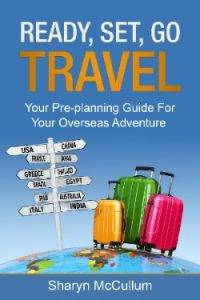
Join Me and Subscribe
Claim your free moving abroad checklist, + receive work and travel abroad tips and news delivered to your inbox., you have successfully subscribed, follow along on facebook, meet live work play travel.
Sharyn McCullum – Travel Writer / Blogger, Remote On-line Worker, sometime Digital Nomad and Travel, Live and Work Abroad Expert. Is a chocoholic, coffee connoisseur and lover of ’80s music. Been travelling all her life thanks to her dad who worked for an airline. Lived in London 4 years on a working holiday. Has holidayed in Hawaii over 15 times and currently calls Melbourne, Australia home. Is inspiring others to live work play travel around the world with this blog. Read more about Sharyn here.
I would love to work in Germany for a bit – or anywhere in Europe really! This is a really helpful guide for people who are unsure about how to sort out everything they need to visit and work in Germany.
As I moved to Germany 4 years ago, this post was very interesting for me! But you wrote everything just how it is and yeah – Berlin is the best option for foreigners! Thanks for the post! Cheers!
Thank you. Glad the info proved correct!
Submit a Comment Cancel reply
Your email address will not be published. Required fields are marked *
Submit Comment
Privacy Overview
You have successfully subscribed..
I will not send you spam, just my newsletter. Unsubscribe at any time.
- Plan Your Studies
- Study Programs
- Universities
- Requirements
- Living in Germany
- Accommodation
- Statistics & News

Work and Travel in Germany

Many of us wish to be travelling the world, meet new exiting people and enjoy their company and cultural peculiarities however we lack the funds to engage in such vibrant journey. There is nothing like facing a new reality and getting inside its skin, sacrificing and pushing your limits in order to truly understand the essence of different angles of perception thus different kinds of people.
Work & Travel programs have proven to be the perfect opportunity to earn money and support yourself financially while you are living a crazy insightful adventure in the country of your dreams. Such an experience will always remain on your memories and look pretty good on your CV for the future.
So why Germany of all the world? Germany has been known to be super friendly to expats, for starters. It is historically a very challenging tier, a living proof of the power of second chances when the will is genuine. Naturally it has some one-of-a-kind treasures and architecturally, it gives the impression of a fairytale once you are wandering in the rural spaces. Germany is diverse, exciting, demanding and giving at the same time. Most importantly it has one of the most dynamic economies operating mostly in the international market which gives you a wide range of job opportunities as a foreigner.
Of course the settlement procedure is never easy yet it doesn’t have to be an obstacle for you. Once you are done with opening a bank account, getting a tax number, a SIM card, finding accommodation and finding a job, the journey will begin. Some of it can be done online from home, like seeking for a job and accommodation while other formalities can be taken care of the first few weeks after your arrival.
Do I need to speak German?
One can’t give a strict answer to this question, unfortunately. It clearly depends on the type of job you are planning to do once you arrive in Germany. It’s true that big German cities are pretty cosmopolitan and the majority of the people speak English so you might not need German to run aprons on daily bases. If you will be working on some international company, some type of internship you might never use German even if you could speak the language, or some job at a call center and so on.
However, if the type of job you choose requires meeting customers you will most definitely need to have some German language skills. It’s recommendable to take some course prior to your departure and practice what you learn once you are in Germany. Work & travel programs in Germany are a perfect way to learn a new language as well, something that will be of your service for ever academically.

Study at Berlin School of Business and Innovation
Creating Tomorrow's Industry Leaders
Do I need a visa?
One can enter Germany if they are citizens of a country marked as “no visa” and stay for 90 day maximum. The EU citizens of course are considered equal to any other German citizen, so they cans stay and work in Germany for ever.
If you are planning to stay for longer than 90 days and you come from the following countries Australia, Canada, Israel, Japan, Korea, New Zealand or the USA you will have to apply for a residency permit as well as work permit and continue your stay in Germany.
There is of course the possibility to simply prolong your visa through the designated embassy without having to apply for residency permit. However, working might become tricky if so.
You will be needing a visa to first enter the country if you come from countries not mentioned above (for more information please visit Germany VISA ). You’d probably need to get a job prior to the application process in order to have a reason to enter Germany and proof that you can maintain yourself during the stay.
Another alternative would be the working holiday visa offered only to citizens of Australia, Canada, New Zealand, Japan, Hong Kong, South Korea and Taiwan that meet the following criteria:
- age between 18 and 30 (35 for Canadians*)
- stays of up to 12 months
- sufficient funds for the first three months (ca. 250 euro per month)
Miscellaneous/Random – The type of jobs most frequently encountered in such an occasion would be random youth jobs like waiting tables, bartending, hosting at trade fairs, selling at retail stores, motorbike delivering, office assistance, babysitting, au-pairing and so on. These are considered student jobs and are minimum wage jobs, yet the best part is that you aren’t obliged to pay taxes on the salary. Germans refer to them as mini jobs. If you are travelling to Germany for no other reason but travel and make some money on the road the following job alternatives are what you should be looking for:
- Au-Pairing / Baby sitting
- Bars and Clubs or similar Entertainment Facilities
- Amusement Parks
- Call Centers
- Office assistance
- Summer jobs (if you are travelling to Germany during the summer months) – It refers to field work in Farms or Vineyards, a great possibility to relax from civilization and experience a true rural expedition.
Internships/Career building
If you are already oriented in what you will be doing for the rest of your life, you might as well use the traveling opportunity to complete some study related internship in a multinational company in Germany. It’s a win-win situation, where you will challenge yourself culturally and academically while enjoying the perks of this new country.
Language Summer Schools
If your primary aim is to develop your German language skills and earn some money on the way, summer months are the ideal time of the year to be travelling to Germany. Almost every major University organizes German Language Courses within the Summer School where everyone is welcome to apply. This was you will get a formal invitation once you’ve enrolled in the program which makes the visa issuing much more easily. Once in Germany you can start looking for a mini-job to fund your entertainment.
Volunteer work
You will most definitely earn no money by engaging in volunteer work yet the experience is food to your soul, and most probably you will have food and a roof over your head. This noble gesture might turn out to be life changing, so never underestimate the power of the good will.
How much you earn in your part-time job depends heavily on your experience, the sector and the employment situation in which you are working. In cities like Munich and Hamburg, student salaries are usually higher, but so is the standard. Five to ten euro an hour is usual.
Everyone who works in Germany has to pay taxes and the sum varies solely on the person’s income. An exclusion would be having a so called mini job, a common student job that pays 400 and below euros per month. In this case you are relieved from any taxes.
People who earn less than 8.004 euros per calendar year receive a tax refund at the end of the year if they submit an income tax statement to the tax authority of their place of residence.
Also, as an employed part of the German economy you are obliged to pay pension contributions which usually sums for 9.95% of a person’s income. Students, however pay a reduced sum just as part time employees who earn around 400-800 euros monthly.
Work and Travel weblinks:
rahhal.wego.com – Information and Tips about Travelling In Europe & Worldwide – (Arabic language)!
work-and-travel.co – Information and Tips about Work and Travel Worldwide – (German language)!
Join 262,114 students interested in studying in Germany

Download The Guide

Quick Links
8 Steps to Study in Germany How To Apply To Study in Germany German Education System Requirements Universities in Germany International Programmes Financing Your Studies German Student Visa German Health Insurance Germany Blocked Account Learn German Guide German Cities Cost of Living
Latest News and Statistics
Over 3,800 university students in germany were under 18 in 2022, higher education in germany: key trends & statistics, german universities’ spending €3.3 billion higher in 2022, daad allocates €120 million for recruiting international students as highly skilled workers in germany, int’l students in germany to enjoy more employment freedoms under new immigration law.
© 2012 - 2023 - Studying in Germany - All Rights Reserved.
- Privacy Policy
- Cookie Policy

Quick-Check
With the Quick-Check, you can check your options of working and living in Germany.
Why Germany?!
Discover the numerous advantages that make working and living in Germany so appealing: from a flourishing economy and safe working conditions to legally guaranteed holidays and a strong sense of solidarity within society. Read in our new “Why Germany?!” section why the federal republic should become your new adopted country of residence!
The new EU Blue Card from November 2023
What is changing? From now on, significantly lower salary thresholds for career starters in regular and bottleneck professions apply. On certain conditions, IT specialists without formal qualifications but with specialised knowledge gained from work experience are able to receive a Blue Card as well. Additionally, joining people in possession of an EU Blue Card via the family reunification process as well as the arrival of Blue Card holders from other EU Member States to Germany will be facilitated with the newly introduced changes.
Job listings
Find the job that fits your qualifications. The "Make it in Germany" job listings have thousands of interesting job offers in Germany ready for you.
To the job listings
Start your career in Germany as a professional driver, train driver or in the shipping industry
Careers in Germany: Find out which professions are in high demand
Information in Russian about working in Germany and visa requirements
Getting a visa, studying or learning German? Find points of contact all over the world
What visa options does Germany have?
Living in Germany with your family: How family reunification works
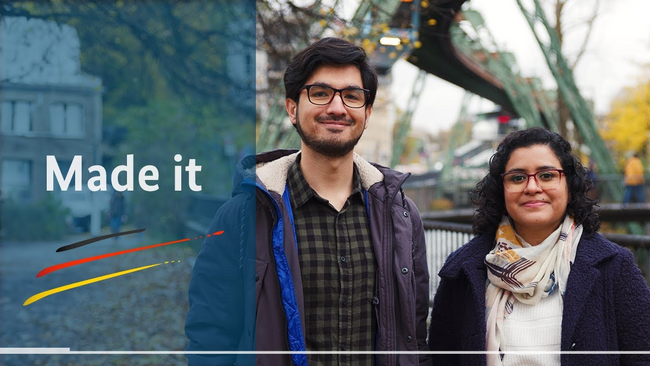
We made it: Family reunification
Rosalia and Roberto from Mexico were able to use the family reunification option to fulfil their dream for the future: To live and work in Germany. In this video, the couple talks about how everything came about: Applying for an entry visa and for a residence title, looking for accommodation and obtaining a residence title in Germany as well as the requirements to fulfill.
More videos
work visas were issued in 2022.
people in Germany were in possession of an EU Blue Card in 2022.
foreign healthcare workers were employed in Germany in 2022.
The reform of the Skilled Immigration Act
With the new version of the Skilled Immigration Act, the Federal Government is creating attractive prospects for international skilled workers. The immigration of skilled workers with vocational training as well as persons with practical professional expertise will be facilitated. We inform you about the changes and new opportunities for employment in Germany.
Events for living and working in Germany
Here you can find events and workshops that can help you with your career and with settling down in Germany – either online or in your area.
More Events
Make IT in Germany: IT experts wanted
Are you looking for challenges in the IT industry? Germany offers great career prospects for IT specialists.
Do you have any questions?
Let us advise you on your opportunities to work and live in Germany. Our experts will support you with questions regarding job search, visa, recognition and learning German.
You can find out more about the various contact options by clicking on one of the icons in the bar below.
- Learn more about: E-Mail E-Mail
- Learn more about: Hotline Hotline
- Learn more about: FAQ FAQ
Please switch to a modern browser (e.g. Google Chrome, Firefox or Microsoft Edge) in order to enjoy the best user experience.
Proceed anyway
Cookies on GOV.UK
We use some essential cookies to make this website work.
We’d like to set additional cookies to understand how you use GOV.UK, remember your settings and improve government services.
We also use cookies set by other sites to help us deliver content from their services.
You have accepted additional cookies. You can change your cookie settings at any time.
You have rejected additional cookies. You can change your cookie settings at any time.
- Business and industry
Travel to Germany for work
Check if you need a visa or permit to work in Germany and how to get one if you do.
This guide is for British citizens travelling for business or other work purposes. It explains what employers, employees, or the self-employed need to do if they need a visa or permit.
This information is provided as a guide only. You must always check the exact application process and document requirements with the German embassy or immigration authorities .
Entry requirements
If you’re going to Germany to work (or any other EU country , Switzerland, Norway, Iceland or Liechtenstein) you must make sure you meet passport and other travel requirements .
Germany is in the Schengen area . If you’re travelling for business for up to 90 days in a 180-day period, you may be able to do some business-related activities without needing a visa or permit, such as attend business meetings. It does not matter how many countries you visit in the Schengen area. Your total stay must be no more than 90 days in every 180 days. The 180-day period keeps ‘rolling’.
If you’re staying for longer, or for other types of work, you may need a visa or permit.
The German authorities are responsible for setting and enforcing entry rules. They decide which activities need a visa or permit, or which may be exempt.
You must always check with the German embassy or immigration authorities before you travel, to make sure you meet their legal requirements.
If you’re working in more than one country, you need to check the entry rules of each country.
If you need a passport, visa or permit, you should apply well in advance of travel.
Visa and permit documents
This guide explains the general application process for some of the visa or permit types available in Germany. It includes a checklist of documents that you’ll usually need to include when applying.
It may not cover all scenarios so you must always check the exact application process and document requirements with the German embassy or immigration authorities .
You must also check what format the documents should be presented in, including if they must be:
- ‘legalised’ (with an apostille) or notarised
- originals, or if copies are acceptable
- signed in ink (a wet signature), or if they can be signed electronically (an e-signature)
- dated within a certain period of time, such as 30 days before you submit your application
Countries often use the terms visa, work permit and residence permit differently. For example, some may refer to a work permit as a visa.
This guide uses the same terms used in Germany, so you know which ones to use when speaking to the German authorities.
Check if you need a visa or permit
You do not need a visa or permit if you’re travelling to Germany for up to 90 days in a 180-day period for specific business-related activities. These activities can include:
- attending job interviews
- going to court as a witness
- attending trade fairs
- board meetings
- meeting clients or customers, including entertainment such as eating at a restaurant
- meeting colleagues, contractors, sellers, suppliers or other customers for business meetings
- fact-finding visits, as long as it’s not an essential part of the project or a day-to-day work activity
- negotiating deals or contracts
- attending, speaking or presenting at a conference
- team building activities
- leisure travel such as holidays or visiting friends or family
Or for the following types of training, so long as it’s for the same company or group and does not exceed 90 days in a 12 month period:
- classroom-based training
- on-the-job training
- shadowing someone’s job, as long as the focus is on training
These activities are covered by the Schengen waiver .
Border checks
At the border, you may be asked to show:
- proof of return travel, such as plane or train tickets
- health insurance that covers your stay
- proof of accommodation for your entire stay
- enough money for the duration of your trip
- an invitation letter explaining your trip, or a plan for any training you’ll be doing
Check Germany’s exemptions
Certain types of work and activities do not require a visa or permit because they’re exempt.
All countries have their own exemptions. What may be exempt in one country may not be in another. You should always check with the country’s authorities.
Exempt for 90 days in 12 months
The following do not require a visa or permit in Germany if they’re for less than 90 days in a 12-month period:
- academic staff, such as scientists, technicians, engineers or language teachers working at research or higher education institutions (does not include researchers at accredited research institutions)
- teachers working at state or approved private schools
- internships, if you meet legal requirements – check these with the German authorities
- journalists employed in the UK and living outside Germany
- fashion models
- after sales service, such as installing software or machinery, or completing technical maintenance, repairs and training – your employer must submit a notification to the German Federal Employment Agency before you start working
- travel guides who accompany tourist groups to Germany – you must keep your regular place of residence in the UK
- translators who need to take part in meetings and discussions in Germany – you must keep your regular place of residence in the UK
- international (cross border) rail and road traffic industry workers – including drivers who collect and unload deliveries, bus or coach drivers, train operators, train service staff and attendants
- sea and air transportation workers, such as international ship crew, sea pilots, technical staff, passenger service staff and plane crew – aircraft pilots, engineers and navigators employed by German companies will need a work permit
- speaking, lecturing or performing in science, the arts, entertainment or sports of special interest (performers and their assistants) – you must keep your regular place of residence in the UK
- working in special cultural or musical events or festivals, or in the film and television industry
- working in a recognised voluntary position or carrying out charitable or religious work
Also, sport and e-sport professionals and trainers working for a German sports organisation or taking part in German competitions with these conditions:
- you must be over 16
- the sport organisation must pay at least 50% of the minimum contribution to the statutory insurance pension scheme
- the German national association for your sport must recognise you as a professional athlete or trainer (this is only possible for the top leagues in sport, except for football, where the second league is also acceptable)
Exempt for 90 days in 180 days
Directors, board members and business leaders are exempt for up to 90 days in a 180-day period. For more than 90 days you need a long-term work permit from the first day of work.
If you have an EU intra-company transfer permit (EU ICT) from another country you can work in Germany for 90 days in a 180-day period. Your employer has to notify the German Federal Office for Migration and Refugees (BAMF) .
This exemption is covered by the Schengen visa waiver .
Show proof of exemption
You need to be able to show proof that you’re exempt to the authorities on request. This could be:
- an assignment letter
- employment confirmation
- proof of required qualifications
Further checks
If you’re not sure if you need a visa or permit to travel you can get advice from the German embassy or immigration authorities .
Applying for a visa or permit
This guide outlines the steps required for each visa or permit, but you must check the exact rules and processes with the German embassy or immigration authorities .
Usually, you should apply for a national D visa so you can start working. You then apply for a longer-term residence permit once in Germany.
Taking your family
You may be able to apply for dependant permits if you have a family and want them to join you. It depends on the type of work permit you have.
Find out about taking your family with you .
Short-term visa and work authorisation
If you’re going to Germany for less than 90 days, and the activities do not fall under the list of exemptions , then you can apply for a Schengen C visa with work authorisation .
Long-term visas and permits
Germany offers long-term visas and permits for work for stays of over 90 days. They are valid for up to 4 years depending on which one you need.
You must apply for one if your profession is not exempt or you’re in Germany because you’re:
- transferring to a German branch of a UK-based company (intra-corporate transfer), even if it’s for a short period of time
- working for a German company on a German employment contract
- providing services to a client in Germany
- providing services as a self-employed worker or setting up a business
- conducting research work
Transferring to a German branch of a UK-based company
You need one of these permits if your UK-based company moves you to a German branch to work:
- international staff exchange programme
- EU intra-company transfer permit (EU ICT)
If you do not qualify for these permits, you may also be able to get a permit for privileged nations .
International staff exchange
If you need to work at a German branch temporarily, your employer can use the international staff exchange .
To qualify your employer your employer must:
- be registered with the personnel exchange department of the German labour office
- have a branch in Germany and exchange staff with their offices in other countries
- have at least a bachelor’s level degree or equivalent professional experience
- keep your UK employment contract – this must be valid for the length of your stay
- be paid a salary that is equivalent to the standard German salary for somebody in a similar position and with a similar background
The international staff exchange permit takes up to 12 weeks to get. It’s valid for up to 3 years (or up to the end of your passport validity, if shorter) and cannot be extended. You can apply for the permit again 6 months from the expiration of the previous permit.
If you have a family, they can join you as dependants. Find out about taking your family with you .
How it works
You need to check with the German authorities on the exact process. This is a rough guide to help you prepare.
If you are applying outside of Germany, there is an option for your employer to submit a request for pre-approval from the Federal Employment Agency (FEA) before you apply for your visa. This will speed up the process.
If you are applying outside of Germany and have pre-approval from the FEA :
You book an appointment through the German Visa Application Centre (TLS) booking system .
You complete the online D-visa application form , print the form, sign it and submit the application form and documentation requirements in person at the visa application centre
After arrival into Germany:
You must register your German residential address at the local city hall within 14 days of moving into permanent accommodation if staying in Germany more than 3 months.
If you intend to stay in Germany after your national D-visa expiry date, you will need to submit a residence permit application at your local immigration office before your D visa expires – check with them which forms and documents you need.
If you are applying outside of Germany and you do not have pre-approval from the FEA :
You book an appointment via the Embassy’s booking system
You complete the online D-visa application form , print the form, sign it and submit the application form and documentation requirements in person at the Embassy in the UK . The Embassy will request for pre-approval once your application has been filed.
If you have a German residential address, you must register your address at the local city hall within 14 days of moving into permanent accommodation if staying in Germany more than 3 months.
If you are applying in Germany:
You must register your German residential address at the local city hall within 14 days of moving into permanent accommodation if staying in Germany more than 3 months
You complete the residence permit application form, print the form, sign it and submit the application in person with the local immigration office in Germany . The local immigration offices often have their own forms. If you’re applying while in Germany, always check with the office before submitting your application.
You will not be able to start working until you have your final residence permit.
Application documents
German authorities may request different documents at different stages of the process. Usually, they need:
- completed D-visa application form or local equivalent
- declaration of employment form (‘Erklärung zum Beschäftigungsverhältnis’), to be completed by your employer
- form B ( ‘Zusatzblatt B’) under ‘fast track procedure for skilled workers’ to be completed by your employer
- completed residence permit application form for post arrival procedure, if required
- 2 standard passport photos (35mm x 45mm)
- passport for you and any accompanying dependants – valid for 6 months, less than 10 years old, and with at least 2 blank pages
- degree or qualification certificate relevant to the job
- job description
- signed assignment agreement with your employer
- organisation chart showing the relationship between the UK and German operations
- birth certificate, for any accompanying children ( legalised with an apostille )
- marriage certificate, if your spouse is accompanying you ( legalised with an apostille )
- health insurance cover in Germany, for you and any accompanying dependants
- proof of residence in Germany, including signed confirmation from the landlord (required once you get to Germany)
EU intra-company transfer (ICT)
You need an EU intra-company transfer permit (EU ICT) permit) if your UK-based company moves you to a branch in Germany to work for:
- up to 3 years, if you’re a manager or specialist
- up to 1 year, if you’re a trainee
- be a manager, specialist or trainee
- have specialist knowledge in the field
- have worked for the company abroad for at least 6 months
An ICT takes up to12 weeks to get. You can not extend it beyond the 3 years, or 1 year for trainees. You can apply for the permit again 6 months from the expiration of the previous permit.
If you have a family they can join you as dependants. Find out about taking your family with you .
- organisational chart showing the relationship between the UK and German operations
Working for a German company on a German employment contract
You need to apply for one of these permits if you have an offer of employment with a company in Germany:
EU Blue Card
- visa for qualified specialists
- privileged nations permit
You can apply for an EU Blue Card if your qualification is relevant to the position.
You must have either:
- a recognised degree from an accredited university outside Germany
- a degree from a German university
- a tertiary-level qualification that took at least 3 years to complete
If your degree is not recognised you can apply to get it recognised . The authority aims to examine documents within 3 to 4 months but it can be quicker.
You must also:
- have an offer of employment with a company in Germany for at least 6 months
- pay social security contributions in Germany
- meet the minimum annual salary requirements
The EU Blue Card takes up to 12 weeks to get. It’s valid for up to 4 years (or up to the end of your passport validity, if shorter) and can be extended.
This permit type can lead to permanent residence if you meet the criteria.
If you are applying outside of Germany:
You complete the online D-visa application form , print the form, sign it and submit the application form and documentation requirements in person at the visa application centre sign it and submit the application form and documentation requirements in person at the visa application centre
- passport for you and any accompanying dependants, issued within the last 10 years and valid for 6 months with at least 2 blank pages
- work permit pre-approval, only for shortage occupations
- signed employment contract with a German company
Qualified specialists
If you’re a qualified specialist you can apply for a visa for qualified specialists (work permit).
To qualify you must:
- have an offer of employment with a company in Germany
- have specific knowledge, skills or experience in the field
It takes up to 12 weeks to get. It’s valid for up to 4 years (or up to the end of your passport validity, if shorter) and can be extended.
- degree certificate relevant to the job
Permit for privileged nations
You can apply for a privileged nations permit if you’re:
- transferring to a German branch of a UK company
- working for a German company based on a German employment contract
- providing services to a client when your company does not have a branch in Germany (Direktentsendung)
If you’re providing services you need to make sure you could never be classed as temporarily employed by the client. You must:
- stay employed in the UK
- report to your UK employer and not directly to the client
You do not need to meet any educational or experience requirements for this permit.
You’ll be labour market tested so must be able to show that you have the necessary skills and experience for the job.
The privileged nations permit takes up to 12 weeks to get. It’s valid for up to 4 years (or up to the end of your passport validity, if shorter) and can be extended.
- work permit pre-approval, if available
- signed employment contract with your employer
Self-employed work
If you want to provide services as a self-employed worker or set up a business, you’ll need a visa for self-employment (work permit). To qualify you must:
- show there’s economic interest or regional demand for your services
- prove that your activities have a positive effect on the German economy
- be able to support your activities either with your own money or with an approved loan
- support yourself without burdening the German social security system
It takes up to 12 weeks to get. It’s valid up to 3 years (or up to the end of your passport validity, if shorter) and can be extended. This permit type can lead to permanent residence after 3 years if you meet the criteria.
- completed D-visa application form or local equivalent
- proof you can support yourself financially with your chosen work
- proof your work fulfils an economic interest in Germany, such as a business plan or confirmation letter from the Chamber of Commerce and Industry (Deutsche Industrie- und Handelskammer)
- proof of enough personal money or a loan approval
- proof of trade such as a professional licence, if applicable
- proof of retirement provisions if you’re over 45
Research work
You can apply for a visa for research (work permit) if you have an offer of employment with a recognised research institution.
To qualify:
- the institution must sign a confirmation they will be covering your living expenses and pay your return travel costs to your home country within 6 months after your position ends
- you must have either a PhD or a qualification that will allow you to start a PhD programme
The visa for research takes up 12 weeks to get. It’s valid for at least a year (or up to the end of your passport validity, if shorter) and can be extended.
If you have a family they can join you as dependants. Find out about taking your family with you .
- hosting agreement between you and the German international research institution
- proof of residence in Germany including signed confirmation from the landlord (required once you get to Germany)
German government guidance
Read official German government guidance on visas and permits .
Check for travel changes
European governments may update or change their rules without notice.
You should always check general travel advice for Germany , for updates on issues, such as safety and security, entry requirements and travel warnings before travelling, or planning to travel.
Updates made to reflect new visa legislation and process requirements, and processing times, including to: Transferring to a German branch of a UK company; Working for a German company on a German employment contract ; Self-employed work. Hyperlinks updated to offer English-language versions of webpages.
Content reviewed. No changes made. (The information provided is up-to-date as of 11 September 2023.)
Content reviewed. No changes made. (The information provided is up-to-date as of 21 July 2023).
Clarified that the online D-visa application form can be used only for applications made at the embassy/consulate in the UK. Applications made at local immigration offices in Germany may use a different form. Updated the application documents required for an international staff exchange. (The information provided is up-to-date as of 22 March 2023).
Content reviewed. No changes made. (The information provided is up-to-date as of 9 January 2023).
The national D-visa can now be complered online. We've added details of the forms to be completed by the employer ('declaration of employment' and 'Form B'). The processing time for the qualified specialists and privileged nations permits have changed to 8 to 12 weeks. The information provided is up-to-date as of 23 September 2022.
Updated salary criteria for qualified specialists. The information provided is up-to-date as of 30 November 2021.
First published.
Related content
Is this page useful.
- Yes this page is useful
- No this page is not useful
Help us improve GOV.UK
Don’t include personal or financial information like your National Insurance number or credit card details.
To help us improve GOV.UK, we’d like to know more about your visit today. We’ll send you a link to a feedback form. It will take only 2 minutes to fill in. Don’t worry we won’t send you spam or share your email address with anyone.

Work and Travel
Work & travel germany.

Description
Train, learn and win an unforgettable experience by doing our work program in Germany.
Expand your knowledge.
Immerse yourself in a new culture.
He returns home with a thorough knowledge of operations in Germany.
Requirements
• Age between 18 and 30 years
• University or tertiary full time student
• Flexibility in terms of location in Germany and work
• Intermediate English or German language
• Willingness to work overtime or less than 40 hours per week
• Interest in German culture
• Not have a criminal record
What this visa allows
The Working Holiday Germany Program allows you to have a guaranteed job position for 3 months. The program is multi-entry which means that you will be able to enter and leave Germany during your stay. What are you waiting for? Important: it is necessary to apply for the visa at least 2 months prior the date of your trip Ask for our discounts for EU passport holders!
Application process
What is included in the cost of the program?
Guaranteed work
Assistance in finding accomodation in Germany
Health Insurance in Germany
Transfer from the airport
One night in a hostel when you arrive
Medical insurance and flights
Medical Insurance: included in the program fee
Airfare: Between USD 1200 and USD 2000 depending on the date of travel, destination, etc.

- How to – guides
- Skills List
- How to – guides
- North America
- South America
Work and Travel in Europe
Work in europe all year round.
Europe is perhaps the most thoroughly explored continent in the world. High standards of living, small geographical areas, ease of transport, and connectivity between a diversity of cultures means that the backpacking trails have been well worn over the years. Europe is, therefore, a good choice for backpackers just getting started in the work and travel lifestyle. But don’t be fooled - there’s plenty of challenges when it comes to work and travelling in Europe - such as the complex web of languages and visas one must navigate through in the process of moving from place to place. An experienced working traveller will still find plenty of opportunities in Europe where their skills give them an upper hand. There’s an infinite amount of travel guides out there that cover Europe, of course. But none of them specifically targets the Working Traveller. Since you’ve landed on this page, we assume you need unique insight into making this lifestyle successful. Read on and we’ll give you the tools you need for working and travelling Europe. 1. Join up with a hostel The concept of a youth hostel was invented more than 100 years ago, in Europe - Germany, to be precise. The concept has flourished and spread across the globe in the decades since, but there’s no better place to get experience in the industry than in Europe. Every single country guide in this European section has at least one hostel in it, and they are constantly in need of skilled and motivated backpackers to perform any number of tasks. These include cleaner, chef, bartender, receptionist, activities coordinator, yoga teacher, musician, painter…the list goes on and on. 2. Work on a farm Europe covers a wide area with a lot of variety in seasonality, but, very generally, the climate is temperate all over. This means late spring, all of summer, and early fall are the best times to work and travel on a farm. From large-scale industrial farms to organic smallholdings, you can find a farm to work on that will suit your interest. Along with farming is fruit picking or harvesting. In almost every country in the continent, a variety of produce must be harvested en masse annually, usually in the summer and fall. This is good entry-level work for a novice working traveller. 3. Become an educator Teaching is a splendid skill to bring with you on the road as a working traveller. You’ll find plenty of opportunities up and down the continent. You’ll be more needed for teaching English in eastern Europe, where literacy in this language is lower than in western and northern Europe. If you know a language such as Japanese, Mandarin, or Arabic, however, your skills may be requested in western European countries where those in the business sector may need to acquire literacy in a second language in order to conduct their work. Tutoring in tech, science, or sports will be skills requested by hosts in all of Europe.
WORK & HOLIDAY VISA / PERMIT REQUIREMENTS FOR PAID WORK AND VOLUNTEERING IN EUROPE
EU citizens don't need visas for other EU countries. Australians, Canadians, New Zealanders and Americans don’t need visas for visits of less than 90 days. Twenty-six European countries are signatories to the Schengen Agreement, which has effectively dismantled internal border controls between them. They are Austria , Belgium , the Czech Republic , Denmark , Estonia , Finland , France , Germany , Greece , Iceland , Italy , Hungary , Latvia , Liechtenstein , Lithuania , Luxembourg , Malta , the Netherlands , Norway , Poland , Portugal , Slovakia , Slovenia , Spain , Sweden and Switzerland . Cyprus , Croatia , Bulgaria and Romania are prospective Schengen members but have yet to officially join. The UK and Ireland , as well as Russia and much of Eastern Europe (such as Ukraine , Croatia , and Serbia ), are not part of the Schengen Agreement. Visitors from non-EU countries will have to apply for visas to these countries separately. Citizens of the US, Australia, New Zealand, Canada and the UK only need a valid passport to enter Schengen countries (as well as the UK and Ireland). However, other nationals, including South Africans, can apply for a single visa – a Schengen visa – when travelling throughout this region. Non-EU visitors (with or without a Schengen visa) should expect to be questioned, however perfunctorily, when first entering the region. However, later travel within the zone is much like a domestic trip, with no border controls. See HERE for a detailed and frequently updated compendium of current visa/permit requirements for the various European countries.
SEASONAL WORK IN EUROPE
Spring is the start of the growing season in most of Europe. To experience the full process of yielding a succession of crops in Europe, working travellers need to book up work on farms in late winter, so that they can plan to arrive in early spring, right when crops are going into the ground. Spain is a country with a particularly high percentage of land given over to farms, while Moldova and San Marino are two much smaller countries that may fly under the radar for most backpackers, but are incredibly fertile and rural countries in an otherwise built-up continent.
It pretty much stating the obvious to say that summer is the high season for tourism in Europe. Any country in the northern hemisphere that takes a summer holiday will likely choose a European country as their destination. So there’s no better time to utilize your skills in hospitality or build up new ones. Italy is a great option to work and travel to in summer; you can try working in a hotel, homestay or luxury resort, cleaning and cooking for guests. Alternately you can work on boats or yachts intended for tourist day trips, learning how to sail and maintain the workings of a sailing vessel. Other than Italy, try any of the Mediterranean countries for this type of work, including Greece and Croatia.
Now is the time for working travellers to head to various locations for picking produce. The autumn grape harvest is huge across swaths of France, Greece, Italy, and Switzerland, while hops, apples, and hard fruits are picked in the UK and Ireland this time of year. Alternatively, head to the cities to utilize your teaching skills at the beginning of the academic semester. Remember, however, that this work will likely require a more formal application which usually will need to take place months in advance. For work and travel opportunity completely off the beaten path, consider volunteering at a monastery in Macedonia , since the weather conditions are most agreeable in autumn and spring.
Winter will bring some snowfall to most of continental Europe except the Mediterranean, and the ski resort industry is a classic industry for working travellers to get a footing in. The biggest and best ski resorts are in the Alps of France, Switzerland, Monaco, Italy, Liechtenstein, Austria, Germany, and Slovenia. Roles include ski/snowboard instructor, equipment technician, or sales representative in a pro shop. You can also work as a chalet cleaner, chef, or au pair minding the children while parents hit the slopes. Many Europeans celebrate Christmas, so an interesting seasonal industry to get into as a working traveller is booking up roles at holiday markets, selling and wrapping gifts or serving speciality drinks. You can find these markets from London to Munich, and especially in northern European countries such as Sweden and Norway. And finally, if you wish to escape the cold temperature in winter, this is possible in Europe. Just head as far south as you can, to Italian islands like Sicily, where you can find work harvesting citrus fruits from December through February.
ATTITUDE TO FOREIGNERS WORKING IN EUROPE
There’s probably no other set of countries in the world where foreign backpackers and labourers are a more common sight than in Europe. Many locations in Europe are some of the safest and easiest places for a working traveller to come to practice their craft. Just keep in mind that Europe is by no means a homogenous place, so you do your research at each stop along your journey to identify the unique societal customs of the local people. One more useful piece of advice - several cities in Europe are the most touristy in the world, such as Barcelona, Spain. Believe it or not, it is in places like these that you need to be the most mindful of touts, pickpockets, and date rapists. Oftentimes you are safer in that remote African village than in the downtown quarter of a touristy European city on a Saturday night! With all this in mind, however, you should be starting to get excited about the prospect of working and travelling in the great continent of Europe. Have you started to pack your bags yet?
Recent Contributors
- Edited on Jun 17 2021 by
- Edited on Sep 12 2016 by Alex webstars
If you have worked in Europe or live here. Instead of saying `That information is not right` Please sign up to Working Traveller by clicking here and update this page with your opinions on the subject and your views on what the barter points should be. If your a host, you will have a SEO link added to the page directly to your own web site so viewers can see who provided the information. If you are a traveller it will link to your profile.

WORKING TRAVELLER LTD 27, Lonsdale Rd, Blackpool, FY1 6EE, UNITED KINGDOM
Work and travel the world using your skills to gain work experience and references for a good job back home
Log in with your credentials, forgot your details.
- Join as a Workawayer
- Join as a host
- Buy a gift membership
Homestays, Volunteering & Working Holidays in Germany
Important information about visiting: germany.
Meaning of the colours:
By default (toggle switch to the left) hosts who have both yellow AND green indicated for the months you have selected will be shown. If you move the toggle to the right ONLY hosts who have indicated green will be shown.
Meaning of this:
By default (toggle switch to the left) will show hosts who have ANY of the months you have chosen marked as available. This means that some of the months might be marked red (no availability.) If you need to see ALL of the months you have selected as available move the toggle to the right.
Regions in Germany
Germany
- Baden-Württemberg
- Brandenburg
- Lower Saxony
- Mecklenburg-Vorpommern
- North Rhine Westphalia
- Rhineland-Palatinate
- Saxony-Anhalt
- Schleswig-Holstein

Inspiration from around the world
Your next adventure begins today
Join the Workaway community today to unlock unique travel experiences with over 50,000 opportunities around the globe.
Forgotten your password?
Workaway has committed over $20,000 USD from the Workaway foundation to help refugees from Ukraine.
Upon request all workawayers based in Ukraine will have their accounts extended for free until further notice.
Hosts in Ukraine have been temporarily disabled for safety reasons.
If you are a host and are able to take in refugees please add the information in your account and you will be added to our last minute host list .
Should you wish to donate and help please click here .

- Scholarships
HIGHER EDUCATION
Germany is the strongest and most developed economy in the European Union. Gather all the necessary ingredients to make studying abroad an unforgettable experience. We share some reasons to study in Germany:
- Academic level: Its academic system is among the best in the world, German universities stand out for promoting innovation and the comprehensive development of their students. </ li>
- Job opportunities: The German government allows students to work up to 20 hours a week and when you finish the Bachelor’s or Master’s degree you can stay up to 18 additional months to work. If in that period of time the company for which you work offers you a contract, you could stay permanently in Germany, carrying out the corresponding immigration procedures.
- Easy access to education: There are multiple options to study in Germany, even if you don’t have a level of German. Large Colleges and Business Schools offer their programs entirely in English, with simple entry requirements and internationally recognized degrees.
- Friends: The stereotype that Germans are “cold” is very far from reality. The Germans welcome visitors very well, especially foreign students. If you decide to study in Germany, you will probably have a large group of friends who will invite you to parties, play soccer or take a walk around the city.
- Standard of living: Germany is one of the countries with the best quality of life , its cities stand out for their good mobility, safety and job opportunities. Without a doubt, Germany has everything a student could dream of, especially for those who want academic and professional development, with the extra ingredient of having an international education. < / li>
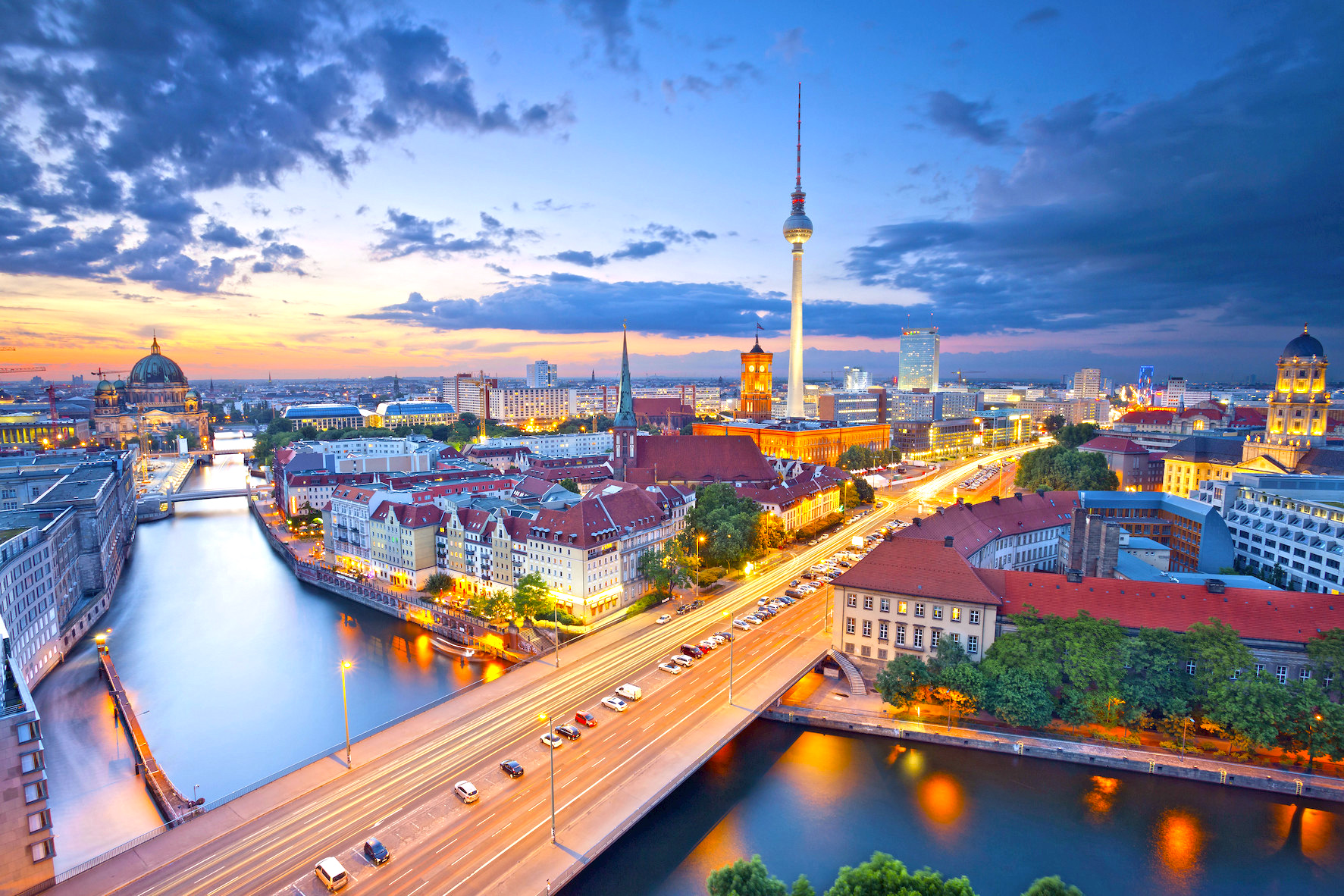
Study in Germany
Ways to legally reside and work in the country:.
- Studying a German course.
- Study a professional career, master’s or postgraduate degree. Students from outside the EU / EEA can also work in Germany while studying, for 120 full days or 240 half days a year.
- Permission to extend stay after graduation: The extension request must be submitted to the local Foreign Office before the student visa expires.

Study and work in Germany
- Opportunity to learn or improve English, while learning another language, such as German
- Cultural exchange: get to know the country, the local culture and traditions
- Connect with students from other countries
- Opportunity to travel and explore other European cities
- Opportunity to work while you study
- Extending your stay in Germany: there is the possibility of extending your residence permit after graduation, in order to reside and work.
Higher Studies in Germany
One of the most popular alternatives among students that:
- They have a High Intermediate (B2) level of English and want to bet on building a professional profile with quality programs, at a good price.
- They want to live the experience of studying in the most developed country in Europe, with the possibility of working while you study
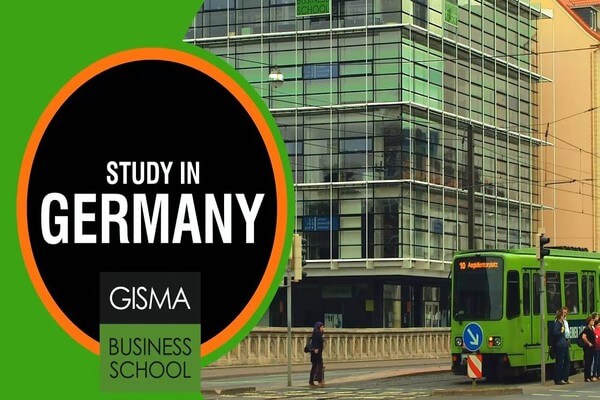
UE for Applied Sciences
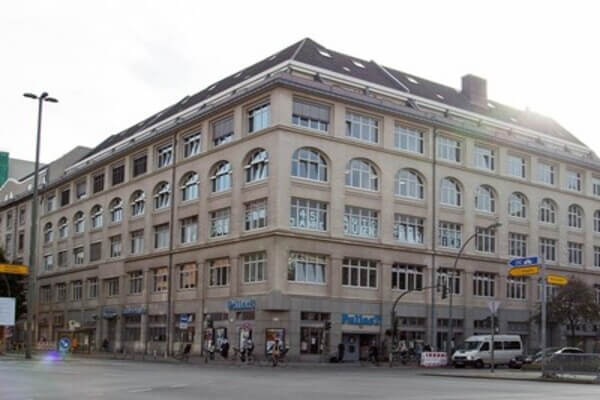
Berlin School of Businnes & Innovation
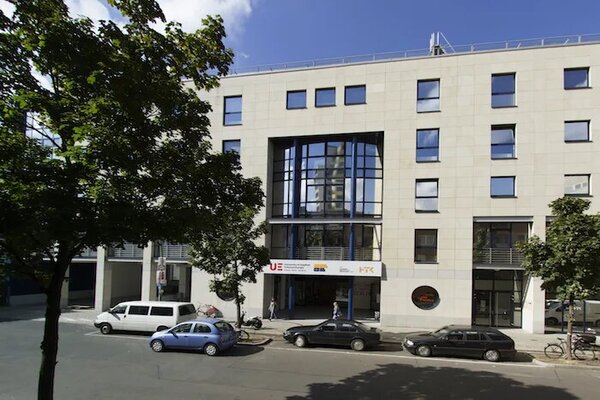
.cls-1 { fill: #fff; } .cls-2 { fill: #005baa; } Fraud Alert
Beware a fraud is circulating.
It has come to our attention someone is using our TravelWorks branding to Lie and mislead you.
We are https://travelworkssolution.com/ NOT affiliated with www.travelworks-travel.com
They are currently using Facebook and WhatsApp and maybe other social media networks too to find subscribers.
They will ask you to register your info on travelworks-travel.com website. If you have already subscribed, please unsubscribe as soon as possible !.
Please be aware members of Travelworks-Travel.com website is NOT affiliated ; they are Not employees of TravelWorks nor do they represent TravelWorks in any way. This is a fraud /a scam as they are using our TravelWorks brand without consent.
Technology solutions for travel agencies and tour-operators
Secured cloud systems ideal for staff working remotely
A comprehensive solution : booking, CRM, inventory, billing, accounting and marketing
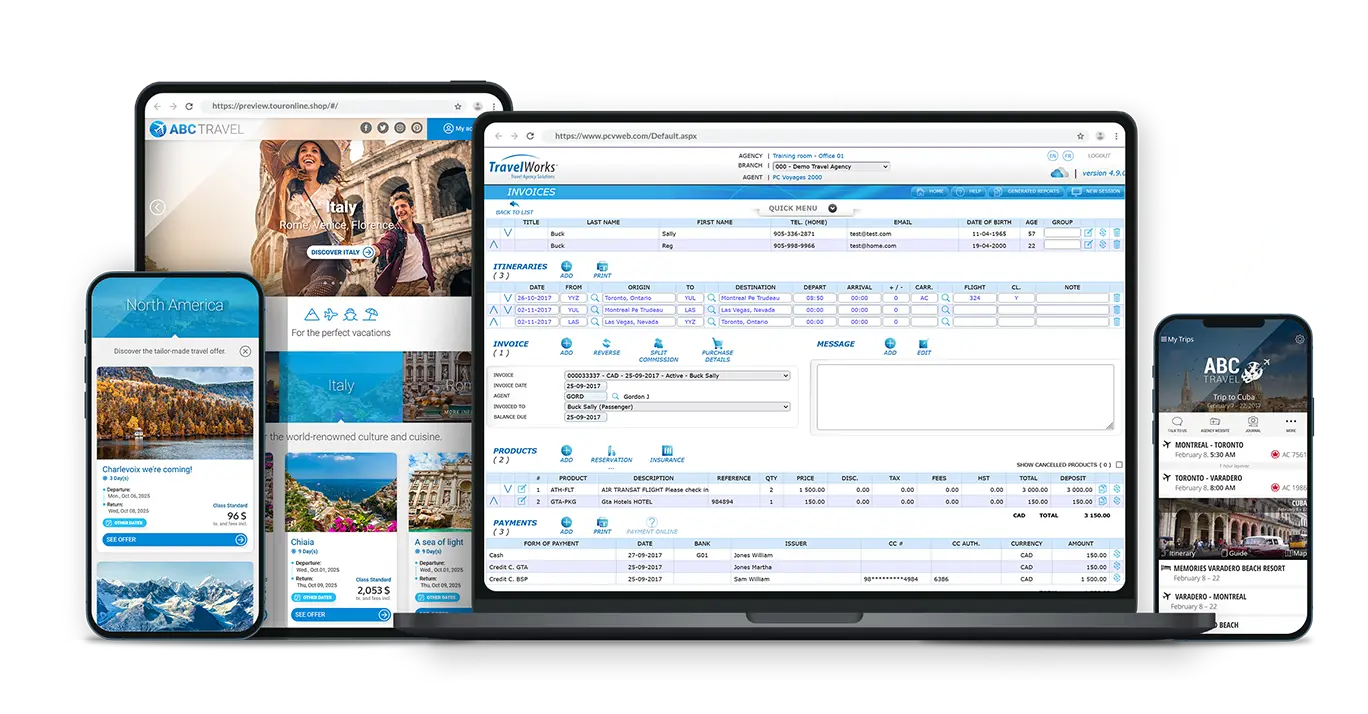
Why TravelWorks ?
Optimize Invoicing and Accounting
Generate profesionnal and standardized invoices. Automate the invoice creation. Maximize your accounting processes with good practices!
Integrated to GDS and Booking Engines
Make a reservation with your current booking engines (Sabre, Galileo, Amadeus, Worldspan, SIREV), the invoice will be automatically generated in our software. The same as with insurance companies.
Cloud System , a Turnkey Solution
CRM Tool and Integrated Marketing
Generate additional revenues with targeted email campaigns. Improve customer service and increase brand loyalty with automated courtesy messages.
A complete solution
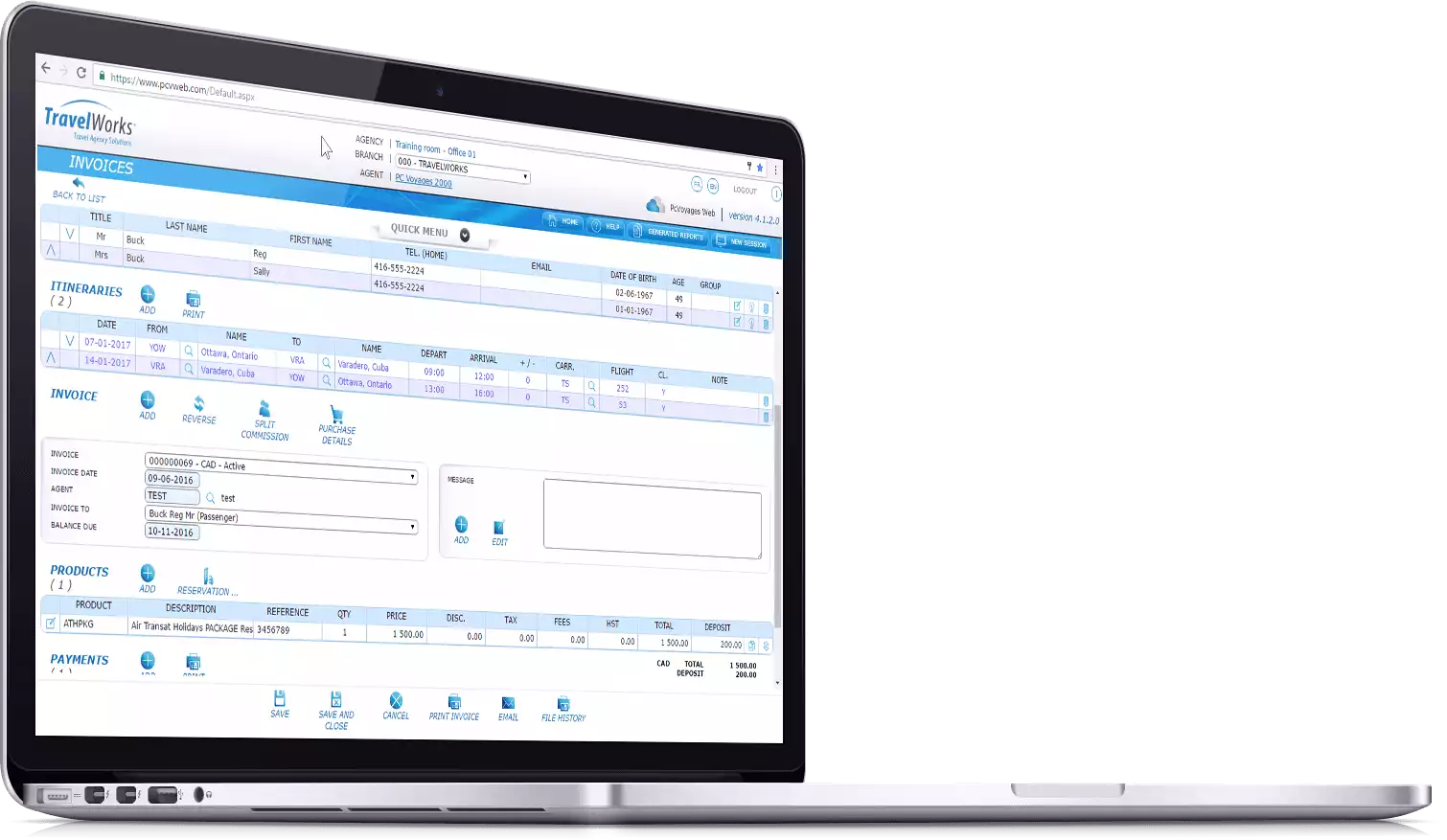
More than 1,000 travel agencies trust us
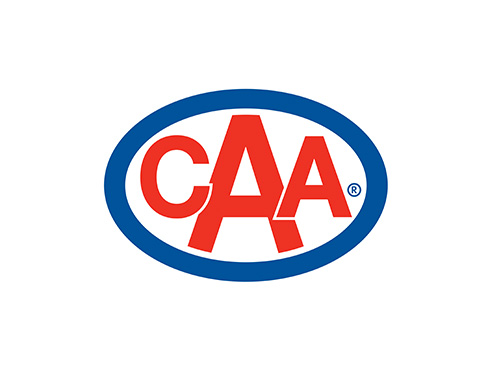
The mobile application for travel agencies
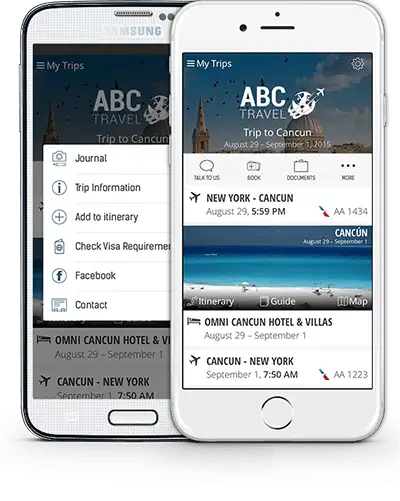
PLANNING A DEMO
Name of Travel Agency:
Country: —Please choose an option— United States Canada Mexico United Kingdom Afghanistan Albania Algeria American Samoa Andorra Angola Anguilla Antigua and Barbuda Argentina Armenia Armenia Aruba Australia Austria Azerbaijan Azerbaijan Bahamas Bahrain Bangladesh Barbados Belarus Belgium Belize Benin Bermuda Bhutan Bolivia Bonaire Bosnia and Herzegovina Botswana Bouvet Island (Bouvetoya) Brazil British Indian Ocean Territory (Chagos Archipelago) British Virgin Islands Brunei Darussalam Bulgaria Burkina Faso Burundi Cambodia Cameroon Cape Verde Cayman Islands Central African Republic Chad Chile China Christmas Island Cocos (Keeling) Islands Colombia Comoros Congo Congo Cook Islands Costa Rica Cote d'Ivoire Croatia Cuba Curaçao Cyprus Cyprus Czech Republic Denmark Djibouti Dominica Dominican Republic Ecuador Egypt El Salvador Equatorial Guinea Eritrea Estonia Ethiopia Falkland Islands (Malvinas) Faroe Islands Fiji Finland France French Guiana French Polynesia French Southern Territories Gabon Gambia Georgia Germany Ghana Gibraltar Greece Greenland Grenada Guadeloupe Guam Guatemala Guernsey Guinea Guinea-Bissau Guyana Haiti Heard Island and McDonald Islands Holy See (Vatican City State) Honduras Hong Kong Hungary Iceland India Indonesia Iran Iraq Ireland Isle of Man Israel Italy Jamaica Japan Jersey Jordan Kazakhstan Kazakhstan Kenya Kiribati Korea Korea Kuwait Kyrgyz Republic Lao People's Democratic Republic Latvia Lebanon Lesotho Liberia Libyan Arab Jamahiriya Liechtenstein Lithuania Luxembourg Macao Macedonia Madagascar Malawi Malaysia Maldives Mali Malta Marshall Islands Martinique Mauritania Mauritius Mayotte Micronesia Moldova Monaco Mongolia Montenegro Montserrat Morocco Mozambique Myanmar Namibia Nauru Nepal Netherlands Netherlands Antilles New Caledonia New Zealand Nicaragua Niger Nigeria Niue Norfolk Island Northern Mariana Islands Norway Oman Pakistan Palau Palestinian Territory Panama Papua New Guinea Paraguay Peru Philippines Pitcairn Islands Poland Portugal Puerto Rico Qatar Reunion Romania Russian Federation Rwanda Saint Barthelemy Saint Helena Saint Kitts and Nevis Saint Lucia Saint Martin Saint Pierre and Miquelon Saint Vincent and the Grenadines Samoa San Marino Sao Tome and Principe Saudi Arabia Senegal Serbia Seychelles Sierra Leone Singapore Sint Maarten (Netherlands) Slovakia (Slovak Republic) Slovenia Solomon Islands Somalia South Africa South Georgia & S. Sandwich Islands Spain Sri Lanka Sudan Suriname Svalbard & Jan Mayen Islands Swaziland Sweden Switzerland Syrian Arab Republic Taiwan Tajikistan Tanzania Thailand Timor-Leste Togo Tokelau Tonga Trinidad and Tobago Tunisia Turkey Turkey Turkmenistan Turks and Caicos Islands Tuvalu U.S. Virgin Islands U.S. Minor Outlying Islands Uganda Ukraine United Arab Emirates Uruguay Uzbekistan Vanuatu Venezuela Vietnam Wallis and Futuna Western Sahara Yemen Zambia Zimbabwe
Information Security: 5 Key Elements for Your Travel Agency
How to manage entertainment expenses, accounting for travel agencies: 5 reasons to use a software tailored for the travel industry.
- Share full article

German Business Is Tangled in Red Tape
Companies in Germany complain that the demands of bureaucracy are costing them time and money that would be better spent building their businesses.
In Germany, a spate of new rules means that Technotherm Heat Treatment Group must prove it complies with the same standards it has been certified as reaching since 2012. Credit... Roderick Aichinger for The New York Times
Supported by

By Melissa Eddy
Melissa Eddy traveled to the German state of Baden-Württemberg to visit companies and speak with their leaders about how bureaucracy is bogging them down.
- April 9, 2024
When Markus Wingens created the position of “energy manager” for the metal heat-treatment company he runs in southwestern Germany, his idea was to increase energy efficiency and attract customers interested in sustainability.
But the job has become as much a task of filling out paperwork and studying seemingly ever-changing laws as it is ensuring that the firm, Technotherm Heat Treatment Group, is meeting energy requirements.
Last year, four new laws and 14 amendments to existing ones governing energy use took effect, each bringing fresh demands for data to be reported and forms to be submitted — in many cases to prove the same standards that the company has already been certified as reaching since 2012, Mr. Wingens said.
“We have the Renewable Energy Act, we have the Energy Efficiency Act, we have the Energy Financing Act, and each comes with an administrative burden,” he said. “It’s madness.”
Freedom from red tape has been a rallying cry for farmers from Poland to Portugal at recent protests against European Union laws and policies. Indeed, the burden of bureaucracy is a general complaint of corporate executives across the globe.

But nowhere is the issue more pressing than in Germany, Europe’s largest economy, which is facing anemic growth of no more than 0.2 percent this year . In a report last month, the International Monetary Fund called “too much red tape” one of the major impediments to reviving the German economy.
For example, it takes 120 days to obtain a business license in Germany — more than double the average in other Western economies. Germany also lags behind the rest of the European Union in the digitization of government services , still requiring written forms for certain tax refunds and building permits.
“We now have such a high workload that we need more and more people to master the bureaucracy,” said Claus Paal, president of the Stuttgart Chamber of Commerce and Industry, who runs a packaging company.
“But these are qualified people who would actually be much better off in production than writing reports or filling out statistics,” he added.
German companies spend 64 million hours every year filling out forms to feed the country’s 375 official databases, according to industry estimates. When the Stuttgart chamber of commerce asked its 175,000 members to name their biggest challenges, red tape topped the list.
Even Germany’s chancellor, Olaf Scholz, has publicly acknowledged that the demands have become too much. “We have reached a situation where, in many places, no one can carry out all of the laws that we have created,” Mr. Scholz said last month.
His government has proposed paperwork-reduction legislation that it claims would save companies and citizens an estimated 3 billion euros each year. Among other things, it would trim the time that companies must retain official documents by two years and end a requirement that Germans staying at hotels in the country complete registration forms.
The red tape drain on time and resources is felt especially by small and midsize firms — those with fewer than 500 employees and annual revenue below €50 million (about $54 million) — that are the backbone of the German economy.
These businesses often lack in-house legal departments dedicated to filing audits, recording statistics and deciphering which information is wanted by which authorities — the European, federal, state and local governments.
For Andreas Schweikardt, a general manager at Gebauer, a chain of seven upscale supermarkets in the southwestern state of Baden-Württemberg, the bureaucracy burden generates menial tasks and increased food waste.
For example, deli workers would take cold cuts that were nearing their expiration dates and use them in sandwiches for quick sale, until a regulation that required detailed lists of all ingredients in all items sold took effect. Now, instead of making new sandwiches — and lists — every day based on what is about to expire, they have a more limited sandwich offering and throw away more meat.
At the seafood counter, fishmongers must now ensure that each variety of fish is labeled in both German and Latin. They also must take the temperature of every fish or fillet, as well as the overall temperature inside refrigerator cases, twice a day.
“At least there is an app where things can be logged, but it would make more sense if the thermometers of the refrigerators were calibrated to report the temperature directly,” Mr. Schweikardt said.
Even the digitization of government services is bogged down by bureaucracy, said Michael Wirkner, who founded an advertising agency in Göppingen nearly two decades ago.
To set up an online registration system for 20 school districts, his firm needed the approval of five regional data protection officers. Each had a separate interpretation of the European Union’s data security regulations; one told Mr. Wirkner that he could use a Google tool, while another insisted it was not allowed.
“So we end up spending time discussing things with hundreds of different people,” Mr. Wirkner said.
After Mr. Paal of the Stuttgart chamber realized how the onslaught of forms was bogging down businesses, his team invited members to send examples of their bureaucratic woes. The chamber asked for detailed information about what companies were being asked to report, from workers’ driving licenses to how they use energy and where they source it.
They have created a database of responses, along with the 60,000 pages of laws governing Baden-Württemberg. Using artificial intelligence, the chamber has created clusters of themes to help companies avoid filing duplicate information.
“With this tool, we can now search through all the laws and say, ‘Name me all the reporting requirements,’ and it comes up with a spreadsheet that lists all the laws that require a company to submit a report to an authority,” said Andreas Kiontke, a lawyer who works with the chamber of commerce.
The tool can also suggest ways to alleviate bureaucracy, which they hope German policymakers will take to heart.
“I think that in other countries, companies are not so concerned about some issues because they simply know that nobody cares that much,” Mr. Kiontke said. He noted that German regulators had imposed the European Union’s sweeping data privacy law on rules governing even professional etiquette. “In Germany, we have regulations about handing over business cards at business meetings and whether it’s still allowed,” he said.
“It’s unbelievable,” he added. “We’ve somehow lost the compass for what still makes sense.”
Melissa Eddy is based in Berlin and reports on Germany’s politics, businesses and its economy. More about Melissa Eddy
Advertisement
When is Eid al-Fitr 2024 and how is it celebrated?
The three-day festival celebrates the completion of the fasting month of Ramadan by Muslims across the world.

As a new moon was not sighted on Monday evening after Maghrib prayers, Muslims in Saudi Arabia and neighbouring countries will fast one more day, completing 30 days of Ramadan. The first day of Eid will then be celebrated on Wednesday, April 10.
The first day of Eid al-Fitr is determined by the sighting of the crescent moon marking the start of the month of Shawwal, the 10th month of the Islamic (Hijri) calendar.
Keep reading
A ramadan no palestinian will ever forget, the cost of a ramadan iftar meal around the world, ramadan 2024: where do your dates come from, in washington, dc: celebrating ramadan, protesting israel’s siege of gaza.
Lunar months last between 29 and 30 days so Muslims usually have to wait until the night before Eid to verify its date.
Other countries follow independent sightings.
When the sighting has been verified, Eid is declared on television, radio stations and at mosques.
![travel works germany Muslim worshippers prepare to take part in a morning prayer on the first day of Eid al-Fitr, which marks the end of the holy fasting month of Ramadan, at the Blue Mosque in Istanbul, on April 21, 2023 [Yasin Akgul /AFP]](https://www.aljazeera.com/wp-content/uploads/2024/04/AFP__20230421__33DL38J__v1__HighRes__TurkeyReligionIslamEid-1712214656.jpg?w=770&resize=770%2C524)
How do Muslims celebrate Eid?
Traditionally, Eid is celebrated for three days as an official holiday in Muslim-majority countries. However, the number of holiday days varies by country.
Muslims begin Eid day celebrations by partaking in a prayer service that takes place shortly after dawn, followed by a short sermon.
![travel works germany Palestinian Muslims perform the morning Eid al-Fitr prayer, marking the end of the holy fasting month of Ramadan in Gaza City on May 2, 2022 [Mahmud HAMS / AFP]](https://www.aljazeera.com/wp-content/uploads/2024/04/AFP__20220502__329C2B2__v1__HighRes__PalestinianIsraelReligionEidGaza-1712214526.jpg?w=770&resize=770%2C514)
On their way to the prayer, which is traditionally held in an open area, Muslims recite takbeerat, praising God by saying “Allahu Akbar”, meaning “God is great”.

It is customary to eat something sweet before the prayer, such as date -filled biscuits known as maamoul in the Middle East. This particular festival is known as the “sweet” Eid – and the distribution of sweets is common across the Muslim world.
Muslims usually spend the day visiting relatives and neighbours and accepting sweets as they move around from house to house.
Each country has traditional desserts and sweets that are prepared before Eid or on the morning of the first day.

Children, dressed in new clothes, are offered gifts and money to celebrate the joyous occasion.
![travel works germany Children ride a swing on the first day of Eid al-Fitr, which marks the end of the Muslim holy fasting month of Ramadan, in the rebel-held town of Maaret Misrin in Syria's northwestern Idlib province, on April 21, 2023 [Abdulaziz Ketaz / AFP]](https://www.aljazeera.com/wp-content/uploads/2024/04/AFP__20230421__33DM4EH__v2__HighRes__SyriaReligionIslamEid-1712214711.jpg?w=770&resize=770%2C513)
Girls and women in many countries decorate their hands with henna. The celebration for Eid begins the night before as women gather in neighbourhoods and large family gatherings for the application of henna.
![travel works germany A girl shows her hand decorated with henna at a market area ahead of Eid al-Fitr, which marks the end of the Muslim holy festival of Ramadan, in Srinagar, on April 20, 2023 [Tauseef Mustafa / AFP]](https://www.aljazeera.com/wp-content/uploads/2024/04/AFP__20230420__33DJ2T3__v1__HighRes__IndiaKashmirReligionIslamEid-1712214614.jpg?w=770&resize=770%2C512)
In some countries, families visit graveyards to offer their respects to departed family members right after the morning prayers.
It is common for Muslim-majority countries to decorate their cities with lights and hold festivities to commemorate the end of the fasting month.
![travel works germany A general view shows the Alif Ki mosque illuminated during the holy month of Ramadan, ahead of Eid al-Fitr, in Ahmedabad on April 19, 2023 [Sam Panthaky/AFP]](https://www.aljazeera.com/wp-content/uploads/2024/04/AFP__20230419__33DH2JB__v1__HighRes__IndiaReligionIslamRamadan-1712214562.jpg?w=770&resize=770%2C513)
Eid amid the onslaught in Gaza
For some 2.3 million Palestinians in Gaza this Eid, this will be the first Muslim religious holiday after more than 33,000 people have been killed in Israeli attacks. With little food aid, and very limited water, Gaza’s Eid al-Fitr will be mired in destruction amid the continuing attacks.

What are common Eid greetings?
The most popular greeting is “Eid Mubarak” (Blessed Eid) or “Eid sa’id” (Happy Eid). Eid greetings also vary depending on the country and language.
The video below shows how people say Eid Mubarak in different languages around the world.

IMAGES
COMMENTS
Entdecke die Welt mit TravelWorks. Ob du Teenie oder erwachsen bist, für zwei Wochen oder für ein Auslandsjahr ein ganzes Jahr ins Ausland möchtest, du Tiere, ferne Kulturen oder Fremdsprachen liebst, helfen, lernen, Geld verdienen möchtest oder eine Kombi verschiedenster Aktivitäten erleben möchtest - wir haben das richtige Programm ...
VOLUNTEER WORK VISA / PERMIT REQUIREMENTS FOR GERMANY. Sweden is part of the European Union (EU) and part of the Schengen Zone. That means your Schengen visa will apply to the whole of the area. You can spend a total of 90 days in the entire area before having to leave for a minimum of 90 days. This applies to all nationalities, apart from ...
Das sind wir! TravelWorks als Marke der Travelplus Group GmbH ist Mitglied von einigen Qualitätsverbänden. Als zertifizierter Reiseveranstalter schicken wir seit mehr als 30 Jahren Teilnehmer aus ganz Deutschland, Österreich und der Schweiz auf Reisen. Und damit du weißt, mit wem du es zu tun hast, wenn du uns anrufst oder uns auf Infotagen ...
Here are some German trip itinerary ideas…. Germany itinerary ideas for a taste of everything: Southern Germany Classic: Munich, the Allgäu (for Castles!), Garmisch Partenkirchen, Berchtesgaden National Park, Stuttgart & Area, Black Forest. Eastern Germany Classic: Berlin, Dresden, Saxon Switzerland.
Call us in Washington, D.C. at 1-888-407-4747 (toll-free in the United States and Canada) or 1-202-501-4444 (from all other countries) from 8:00 a.m. to 8:00 p.m., Eastern Standard Time, Monday through Friday (except U.S. federal holidays). See the State Department's travel website for the Worldwide Caution and Travel Advisories.
Travelling by train in Germany is very convenient, too: the local and long-distance public transport network has trains and buses that serve virtually the entire country. The major cities and their surrounding areas in particular offer excellent transportation links. One convenient option for travel between larger towns and cities is that of ...
Work and Travelers must have health and accident insurance valid for Germany and financial reserves of about 2,000 Euro. Often a return ticket is also required or proof of the necessary money for one. How many months participants in the Working Holiday Programme are allowed to work in Germany and how much money they have to prove as security is ...
Summer At Last: Beer Gardens, Swimming Fun, Strawberry Ice Cream. Summer Pleasures in Germany. Golden sunshine, colourful forests: the Indian summer can also be found in Germany. An ideal time for active holidaymakers and wellness fans. And for epicures, since this is harvest time. Autumn Holidays in Germany. Winter is the favourite season for ...
In general, all applications for a Working Holiday Visa for Germany must include: A valid passport. A biometric passport photo. Proof of funds in the form of a recent bank statement. A travel/expat insurance policyfor the full duration of the Working Holiday Visa. A completed visa application form.
See how you can travel and work on our range of travel trips and packages including working holiday, volunteering, teach abroad, internships & au pair & nanny trips. ... Travel to Germany. Indulge in the smorgasbord of attraction and intricacy that Germany has on offer, from rugged rivers and iconic eats to coastal scenery and festivities ...
Work and Travel Germany - requirements . The first thing one needs to work in Germany through the Work and Travel Program is a working holiday visa (WHI). Germany already has bilateral agreements with multiple countries, such as: Australia, Brazil, Chile, Hong Kong, Israel, Japan, South Korea, Mexico, New Zealand and Taiwan. Anybody between ...
Travel and still save money! Yes, this is possible when you work as an au pair. And if you're in Germany, we have the perfect opportunity. Eligibility for this job includes previous experience, a natural fondness for children, and basic proficiency in German. Check out other c...
Visit www.europa.eu for details. • Working Holiday Visa - A Germany working holiday visa allows people from the age of 18-30 to work and live in Germany for up to 12 months. This program is available for people from Argentina, Australia, Chile, Hong Kong, Israel, Japan, South Korea, New Zealand, Taiwan, Uruguay and Brazil.
One can enter Germany if they are citizens of a country marked as "no visa" and stay for 90 day maximum. The EU citizens of course are considered equal to any other German citizen, so they cans stay and work in Germany for ever. If you are planning to stay for longer than 90 days and you come from the following countries Australia, Canada ...
Christian from Cameroon came to Germany in order to study. But he realised that his chosen course of study did not meet his expectations. In this video, he explains how his transfer from university studies to vocational training worked out. Get started in Baden-Württemberg- Your academic career in the German Southwest!
For more than 90 days you need a long-term work permit from the first day of work. If you have an EU intra-company transfer permit (EU ICT) from another country you can work in Germany for 90 days ...
04/28/2023 April 28, 2023. From May 1, you can use most buses, trams and trains across the country with Germany's new €49 euro monthly public transport pass.
Train, learn and win an unforgettable experience by doing our work program in Germany. Expand your knowledge. Immerse yourself in a new culture. He returns home with a thorough knowledge of operations in Germany.
For work and travel opportunity completely off the beaten path, consider volunteering at a monastery in Macedonia, since the weather conditions are most agreeable in autumn and spring. WINTER Winter will bring some snowfall to most of continental Europe except the Mediterranean, and the ski resort industry is a classic industry for working ...
Thuringia. Join the Workaway community today to unlock unique travel experiences with over 50,000 opportunities around the globe. Volunteer in Germany - Join now the world's leading community for volunteering, working and cultural exchange.
Study and work in Germany. Opportunity to learn or improve English, while learning another language, such as German; Cultural exchange: get to know the country, the local culture and traditions; Connect with students from other countries; Opportunity to travel and explore other European cities; Opportunity to work while you study
A pleasant work environment for travel agents, considerable time-saving for accountants and an essential management tool for travel agency managers. Why TravelWorks? Optimize Invoicing and Accounting. Generate profesionnal and standardized invoices. Automate the invoice creation. Maximize your accounting processes with good practices!
Work and travel trips allow individuals to experience a different culture, learn about local customs, gain work experience in a foreign country, and make valuable connections wherever they go. Whether you're a student, recent grad, young professional, or a digital nomad, working and travelling in Germany and Kosovo can be an exciting adventure.
Roderick Aichinger for The New York Times. German companies spend 64 million hours every year filling out forms to feed the country's 375 official databases, according to industry estimates ...
Almost all the ballistic missiles and drones Iran launched at Israel in an unprecedented attack late Saturday were intercepted and failed to meet their mark, according to Israel and the United ...
8 Apr 2024. 03:23 PM (GMT) Save articles to read later and create your own reading list. As a new moon was not sighted on Monday evening after Maghrib prayers, Muslims in Saudi Arabia and ...